#and i'm on a time limit here
Explore tagged Tumblr posts
Text
I...have to send... an EMAIL! *explodes everything away from me in a perfect circle with my mind*
#shitpost#quil's unholy underworld#goddd I don't like reaching out to people but I want to know this so bad#i gotta know#is this course only offered this semester#because it's got really low enrollment because it's more niche#there are literally only 2 people enrolled in the course rn#so they might only do it in the fall every year#in which case. I need to know#so I can completely rethink my schedule to accommodate it because I really want to take it#it would mess up like half my classes#but! i really wanna take it#so I gotta know. is this just in the fall#or. could I take it next semester in the spring#because I don't want to wait a year#this is. this is something it's better to start sooner#so now I gotta send! an email! to ask to department whether i gotta completely rearrange rn or if. I don't#and i'm on a time limit here#if only i'd know how to properly look up the course when I first registered...I didn't know how they categorized it#so I registered without being able to look it up#but now I found it#and OUGH#i wanna. I wanna take it so so bad
13 notes
·
View notes
Text


The 2024 DCA Reveal-versary magma collab has been wrapped up and here are the final results! ☀️🎉🎂🌙
A super big thank you to all the amazing artists that attended the collab to celebrate! We've broken way over 2023's record of attendees with a overall number of 59+ artists! It really is a lively celestial party in there, they're probably going to need more cake!
An additional thank you to all who stopped by, shared the event, expressed their interest and to the Daycare Friend Pick Up mods for also allowing this in their discord server!
(Due to being over the tumblr tag limit for the full credit list, a reblog will be added onto this with the second section of credits!)
⭐Here's the list of all the artists that participated!⭐
@aquacomet - @crystalmagpie447 - @pure-plum
@thatmooncake - @flinxypie - @eggcromancer
@nexerist - @crabsnpersimmons - @zamjd
@darlingdeer21 - @agent-darkfest - @piowasthere
@nighternex - @gyxtar0luvs - @sulfadimethoxine
@pluck-heartstrings - @starshinenoa - @enduu115
@tvboxi - @tinkpumpkin - @marshmallowcat666
@luckyyyduckyyy - @m-mints - @sunshinehare
@ping-ski - @lil-artist-blog-fandoms-ocs - @sipnoot
@synthrobeat - @galaxysugarr - @alynwrench
(I took care to note down everyone who participated and added their credits, but if I missed someone let me know what you made and I'll add you to the list!)
#aqua events#dca fandom#fnaf dca#daycare attendant#reveal-versary 2024#reveal-versary art#reveal-versary#With so many artists it took that extra bit of time to set up the final post but it's here now! ^^#(I had to nab a fair amount of stray lines a-)#Give me a moment to reblog this with the second collection of credits (I would have them all in one post if it wasn't for the limit raaa)#I'm still astounded by how far this progressed over the days#Thank you all again for all the support!
861 notes
·
View notes
Text



WE ARE | EP11
#we are the series#weareedit#phumpeem#phuwin tangsakyuen#pond naravit#pondphuwin#my edits#we are#we are series#WHEN AM *I* GONNA GET KISSED IN A POOL BY THE WOMAN OF MY DREAMS????#i didnt even intend to post this#but i LOVE how the blues turned out so here ya go ig <3#also there are still quite a few things i would love to gif#BUT#it's almost 1am here#and i think i'm close to hitting my upload limit lol#so i might continue giffing the ep tomorrow if i feel like it and if it hasnt been giffed 3942309 times yet hakjsfhkajhg
754 notes
·
View notes
Text
Female Guidance in Aventurine's Life

One thing I haven't seen discussed in much depth yet, but which I think is especially interesting, is the consistency of female guidance in Aventurine's life: Every single person who we have seen on screen offering Aventurine assistance or making a positive difference in his life is female (with one exception, yes, I'll get there).
Under the read more cause it's longggg:
Before even diving into his family, let's just get the obvious out of the way: Aventurine is, at least supposedly, blessed by a goddess. The very origin of his good fortune--be it actual blessing or curse--comes from the literal "mother goddess" who watches over him. This is one of the only instances in Star Rail where a god character is specifically given a gender, and Gaiathra is not ever ambiguous. She is the classic female fertility goddess with all the trappings of other famous triple goddess figures of the real world. Aventurine's personal belief in the goddess may be shaky, but he nevertheless continues to treasure his people's faith. Thus, at the core, we can say Aventurine is a character who is guarded by the most quintessential mother figure possible.
Now, with the most obvious out of the way:
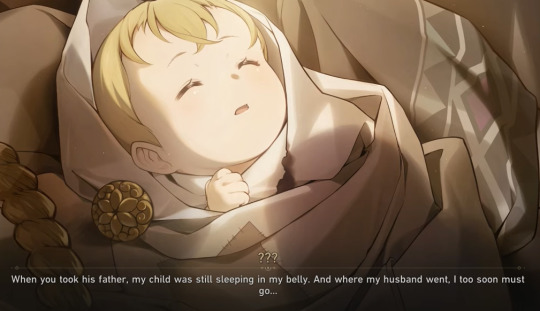
We know that Aventurine's father died before Aventurine was even born, and therefore he would not have any memories of his father, leaving him to be raised by his mother and sister.
Both women clearly made an enormous and lasting impression on Aventurine; they haunt every single one of his memories of Sigonia and are the key elements of the family Aventurine longs to return to. While he flirts with the concept of death as a way to see his family members again, it was also his mother and sister who instilled in him any sense of self-worth and meaning to his existence, the only things keeping him from giving up on living. His mother believed him to be blessed; his sister insisted to his face that not even the only remaining remnant of their mother had any value in comparison to his life.
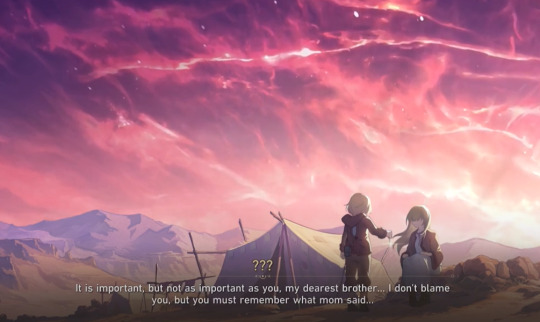
It is for his sister that Aventurine first begins expressing a self-sacrificial nature, and from his sister that this self-sacrifice is reinforced when she uses herself as a shield to help him escape massacre at the hands of the Katicans.
It is also from his sister that Aventurine learns many of the deeply meaningful actions he holds onto to the present day, despite having been so far removed from his own culture.
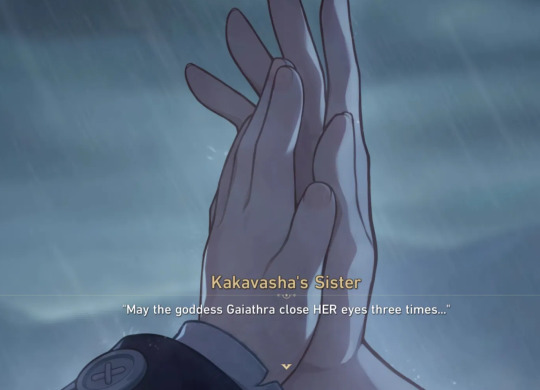
Conversely, every one of Aventurine's early negative experiences on screen appear to have been driven (at least primarily) by men.
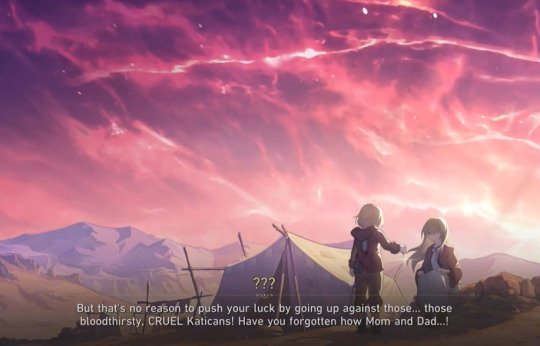
Although the Katican tribe of course would have both men and women, the tribal societies on Sigonia appear to be on the fairly traditional side, with Aventurine's mother staying at the camp with her child while his father was the one to go out and hunt for offerings for Gaiathra. This is also supported by Aventurine asking Jade to take him to her "chief" later on. Therefore, it is likely (although of course not guaranteed) that a majority of the Katicans' army was male, and that Aventurine's early experiences with outsiders consisted almost entirely of indiscriminate pillaging and massacre at the hands of what the Avgin viewed as savage, invading warriors. In separate instances, Aventurine was traumatized by these warrior figures three times--first with the loss of his father, then his mother, and then finally his sister.

And even their hope, supposed to come in the form of the "men in black" from the IPC, completely abandoned them, leaving Aventurine once again betrayed by masculine figures that were supposed to be there to protect him. Led by Oswaldo Schneider, another cruel male authority figure, the Marketing Department of the IPC permitted the wholesale slaughter of Aventurine's people--something which we know Aventurine is now aware of.
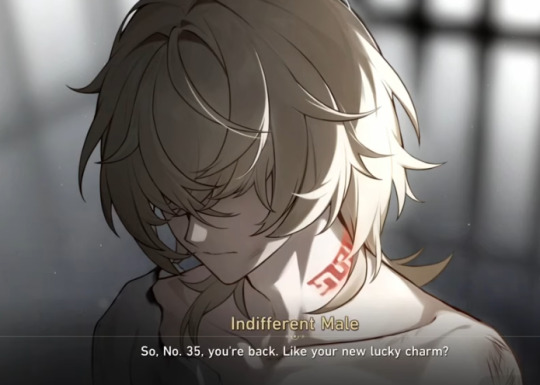
Then, of course, the next piece of Aventurine's backstory we're given is his male slave master. I don't really need to say anything about this, do I? This man violated Aventurine's human dignity and bodily autonomy, and forced Aventurine's hand in a life or death battle for which Aventurine still punishes himself mentally, even years in the future.
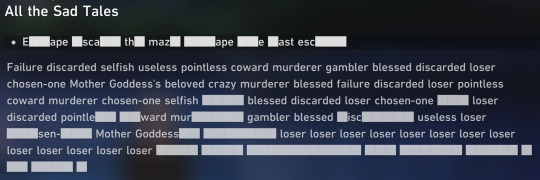
In part to escape the difficulty of his situation and rise to a position where he would have enough resources to--he thought--help his people, Aventurine joins up with the IPC. But when he attempts to make contact with a powerful man in the organization, Diamond, he is instead met by a woman, Jade, who against Aventurine's own expectations determines that she will raise Aventurine up (or use him as a tool, depending on how you currently choose to interpret Jade's motivations), granting him wealth and status beyond his imagination.
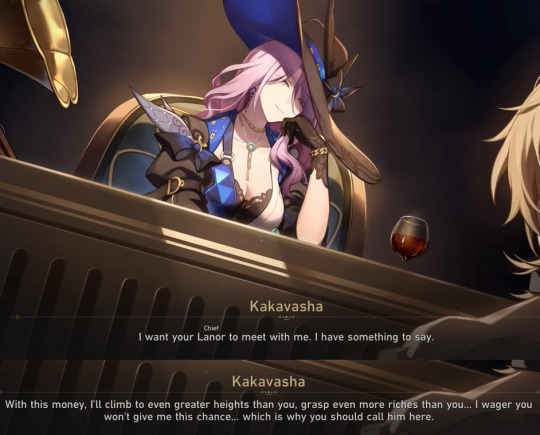
(And this line in particular is interesting, because you can take it one of two ways: 1) Aventurine comes from a patriarchal planet that traditionally put men into positions of power [thereby making his own slavery an emasculating act, aligning him further with disenfranchised women]; thus, he is making the assumption that to get anywhere in this organization, he will need to work with a man; or 2) He actually was counting on Jade taking his bet and helping him right from the beginning, because Aventurine perceives women as inherently more likely to protect and aid him than men would be.)
In the end, Jade does exactly as she claims she will, launching Aventurine into a position of power while also closing golden handcuffs around his wrists. She positions herself not only as his supervisor, but as his advocate and ally. She entrusts him with her Cornerstone, a sign of significant faith in his abilities. She even seems to be keenly aware of his bias towards the mother figure, referring to him as "child" in their conversations.

Whether this is genuine or a manipulation tactic can certainly be debated (and I'm not inclined to think at this point that Jade is a genuinely good role model or selflessly supportive person in Aventurine's life), but whatever the case, women are the only people Aventurine even remotely considers to be "in his corner."
We see this even earlier, in Aventurine's call to Topaz. Like with the example of his mother and sister, Aventurine trusts in Topaz's ability implicitly, and considers her above anyone else when it comes to completing the mission in Penacony.
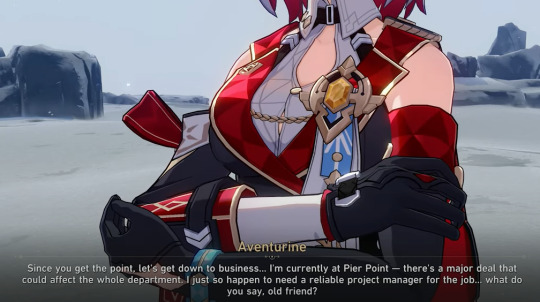
Although of course we don't know if Aventurine has any other friends or allies among the Strategic Investment Department, it seems very likely that Topaz, yet another woman, is the one he is closest with. At the very least, she is the only IPC character (so far) that Aventurine has a complimentary voice line for, one that shows his respect for her talent:

Over and over again, the story aligns Aventurine with female figures in positions of authority, and demonstrates that he is comfortable (although maybe not too comfortable, in the case of Jade) with relying on them and trusting their judgment, just as he did with his mother and sister.
And this pretty much goes off the charts in Penacony, where Aventurine has more involvement with the female cast than virtually any other non-female character (even the Trailblazer!). We set the pattern off right away, with Aventurine immediately being placed into a negotiation situation with Himeko, respecting her role as the Express's leader and working to get himself aligned with the Express by acquiescing to her request for support.
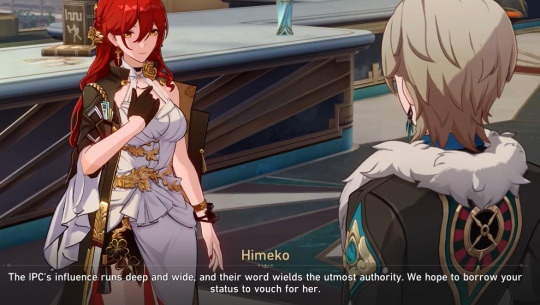
Then there's the fact that Aventurine is the one who finds Robin's body, an event which, although he didn't let it show too much, was almost certainly traumatic for him, given the violent death of his own sister.
Next, twice in Penacony's story, we see Aventurine seek out Sparkle for information. He may not personally like her and her comments may be both racist and dehumanizing, but Aventurine does rely on her--being the only character explicitly seeking her aid, which no one else in Penacony seems to want.
In 2.0...

And in 2.1.
Now, say it with me, guys: Aventurine built an entire portion of his grand plan around the idea that if he looked pathetic enough, a female character would absolutely come and help him. And sure enough, the women come through for him, always! Sparkle gives him the exact last clue he needs to confirm his belief that he could use "Death" to reach the true Penacony, sealing the deal for the rest of his plan.
His plan which also hinged significantly on Black Swan's involvement too, another woman that he views as, if not trustworthy, then at least intelligent and hyper-competent.
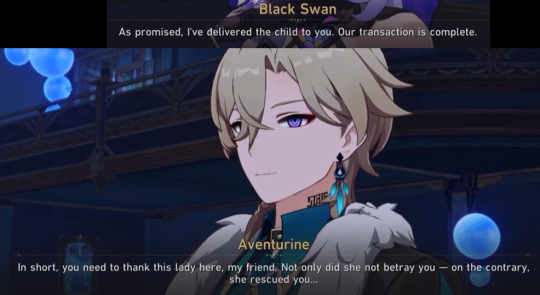
Contrast all this, of course, with the treatment Aventurine receives at the hands of Sunday, the lone opposing male character he faces in Penacony.
Sparkle implies that Sunday would humiliate Aventurine in an unmistakably sexual and degrading way, and Sunday himself professes this same desire to see Aventurine humiliated.
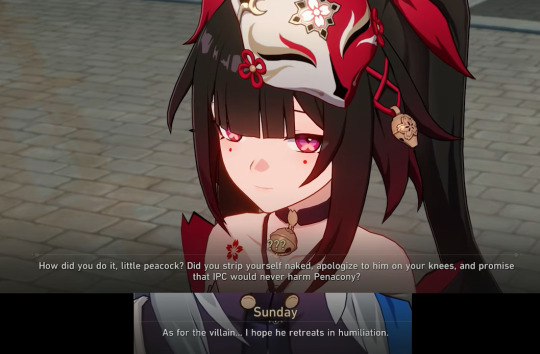
Then we're "treated" to the moment in which Sunday uses the Harmony's (or perhaps actually the Order's?) power against Aventurine, in a scene which is supposed to reflect an interrogation but is also, very clearly, another nonconsensual violation of Aventurine's bodily autonomy and dignity by a man. While ostensibly seeking confirmation of the Cornerstone ruse, Sunday instead subjects Aventurine to unnecessary questions about his past on Sigonia, which recall and force Aventurine to re-endure memories of his trauma.
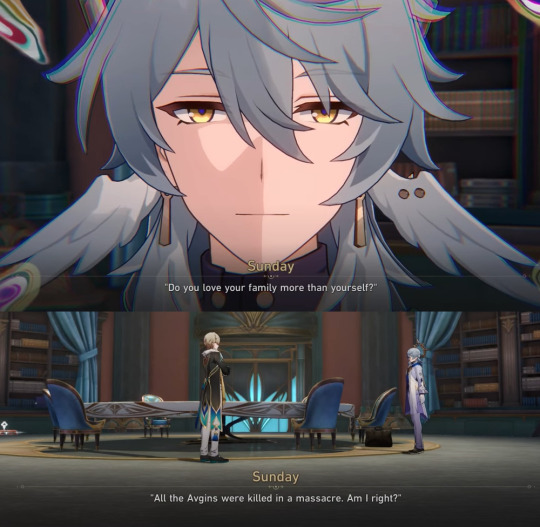
Even if this is what Aventurine prepared himself for and planned to have happen, the pain he experiences is very real, and he suffers both the physical and emotional consequences of Sunday's assault all the way up to his "Death" and possibly even beyond.
(Also, Sunday fans please don't get too up in arms with me for this; I also like Sunday! It's okay for characters to be morally grey!)
I think there's one other interesting example I would bring up here too, and that's Aventurine's conscious decision to weaponize his own masculinity against the Trailblazer. Through the 2.0 and 2.1 Trailblaze missions, Aventurine deliberately acts in an off-putting manner to the Astral Express crew, particularly the Trailblazer, in order to build up to the 2.1 climax where the Trailblazer is supposed to view him as an unrepentant villain and attack him without hesitation.
In order to achieve this uncomfortable, villainous effect, what does Aventurine do? Exactly what other men have done to him.
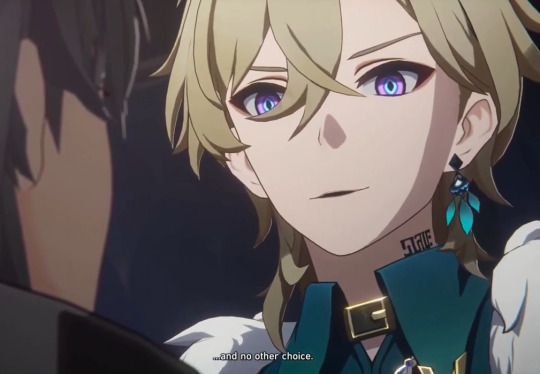
This is especially apparent if you're playing Stelle because of the ingrained societal taboo of a man entering a woman's personal space without consent, but even as Caelus, it is very clear that Aventurine is leveraging behaviors typically used to show dominance: In a complete 180 to all Aventurine's other body language in the game (normally quite withdrawn, frequently in defensive postures with his arms crossed or hand behind his back, almost always standing several feet away from other people), Aventurine violates the Trailblazer's personal bubble, looming over them (Caelus was sitting in this cutscene, lol), forcing eye contact, and commanding the space while informing them that they will have no choice.
For someone who was hunted, enslaved, had his movements restricted with chains, and due to his own slight stature has very likely been towered over by others who were intentionally asserting their power over him all his life, it is clear that Aventurine associates dominant, typically more masculine-coded physically-imposing behaviors with discomfort and even villainy.
Any girl who has ever had a man loom over her like this will realize very quickly: Aventurine wanted to make himself scary so he made himself act more like a bad man.
(Yes of course I know "not all men." I'm not saying every man behaves in this domineering way or that women cannot be domineering too, obviously, just that Aventurine had a very specific image in mind when constructing a "villainous persona," and the physically controlling tactics most typically used by aggressive men toward women was his immediate go-to.)
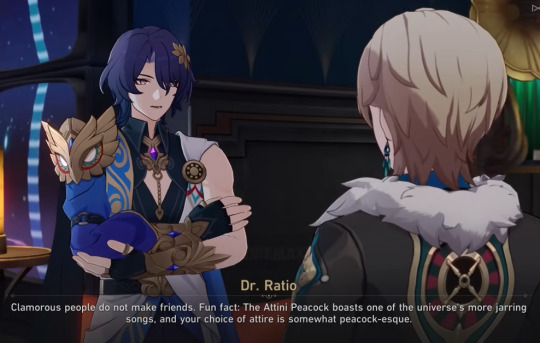
But where does that leave Dr. Ratio, the one male character actually on Aventurine's side?
Frankly, I don't want to derail my post about how intensely Hoyo chose to hammer on the message of "Women will protect you" in Aventurine's story with a discussion about a mlm ship, but the take-away here is going to lead in that direction anyway--so yes, Dr. Ratio is the exception.
What is interesting is that he does not come across as an exception at first, and in fact initially appears as another male character being rude and dismissive to Aventurine. Like, there are still people out there calling Ratio an unrepentant racist for this one.
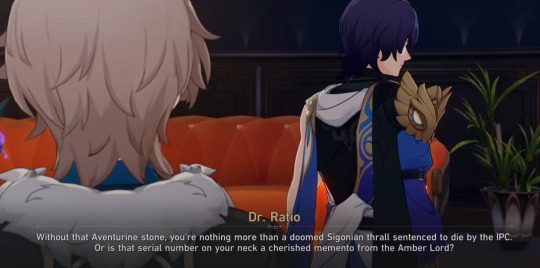
Of course, it's later clarified that this is an act--likely even these insults were scripted specifically to give Sunday's spying ears the "insight" he needed to exploit Aventurine during the interrogation.
But even though it is an act, Aventurine still has noticeable trouble putting his faith in Ratio. He does genuinely doubt him a few times, despite knowing that they are working together to fool the Family.
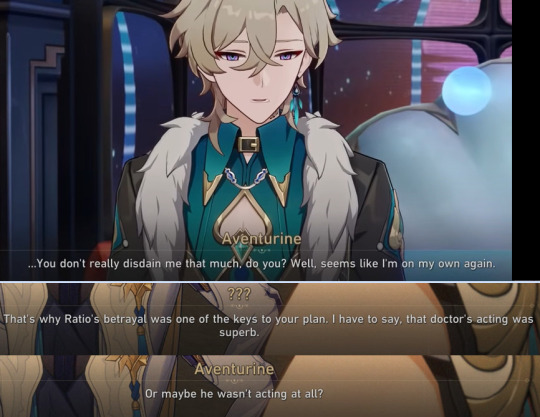
Even his voice line about Ratio confirms that he doesn't think Ratio particularly cares for him; rather, he thinks Ratio simply tolerates him because he's slightly less unintelligent than those around them.
Ultimately, the entire act with Ratio ends up being a mirror of the real scenarios Aventurine has been experiencing with men his whole life (at least as far as we are shown his life). Men abandon him to fend for himself (unwillingly, like his father, or willingly, like Diamond leaving Aventurine to deal with Penacony alone on the inside). Ratio keeps leaving Aventurine completely alone. Men attempt to humiliate him and violate his boundaries (like Sunday and his slave master). Ratio insults Aventurine's appearance and intelligence repeatedly. Men betray him (like Oswaldo Schneider and his men leaving the Avgin to die). Ratio "betrays" him.
I'm not saying when Aventurine devised the plan for their act, he consciously drew up a list of all the ways men had hurt him in the past and had Ratio re-enact them one by one, but like... that's what happened, whether or not Aventurine intended it.
And okay, the shrinking scene in Dewlight Pavilion was just for fun and probably only slightly fetishy, the devs promise; yes, it was supposed to be a joke! ...But it's also not a mistake that this is yet another instance of a male character in a glaringly metaphorical position of power over Aventurine. Aventurine's tiny in this scene! He's completely vulnerable! He's in a dangerous position and the male character could very much hurt him in this moment.

But Ratio doesn't. (In fact, his line here is supposed to be sarcastic, very ha ha--but also, what is Ratio really saying? "I won't do anything to you without your express consent." What a good guy.)
Virtually everything negative that we see in 2.1 is Ratio doing these things as an act at Aventurine's own request. He doesn't actually disdain Aventurine; his own voiceline about Aventurine reinforces that he sees Aventurine as talented and intelligent.
Whatever you think he was apologizing for in their early scene, he's the only person we're ever shown in-game apologizing to Aventurine at all.
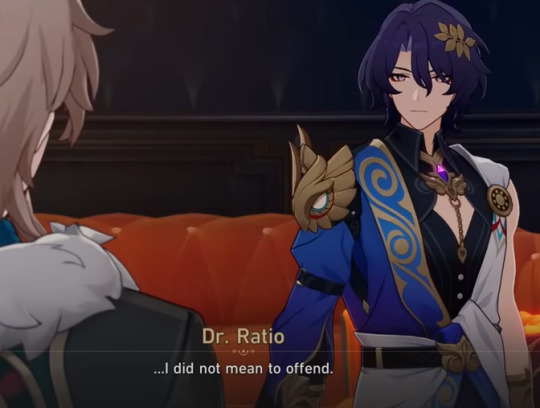
He worked hard to "betray" Aventurine but only as he was instructed to do, and immediately checks in on Aventurine's well-being afterward, even urging him to give up the plan if it becomes too much to handle.
And then, of course, there's the note: "Do stay alive. I wish you the best of luck."
After this point, it cannot be denied that Ratio is unequivocally on Aventurine's side, wants to help him, and is not doing so out of any sense of self-gain but largely because he is a good person who simply cares about Aventurine's fate. By the end of 2.1, it can no longer be doubted that Ratio is the exception to the "gender rule" of Aventurine's life, which--the story shows us again and again--was that guidance, protection, and care for Aventurine come from women, while men repeatedly represent dismissal, betrayal, or pain.
Ratio is, at least as far as Aventurine's story shows us, the proof that men can be good, that things are not as black and white in Aventurine's life as they might appear, and that--if you do choose to ship him with or see Aventurine as attracted to men--his attraction could be validated (and potentially reciprocated) by a male figure who would not bring additional harm to Aventurine's life. Aventurine makes the final decision to live after seeing Ratio's note--the exception to the rule ultimately proves to be the last piece needed to keep him alive.
But I promised I wasn't going to derail my own post about w o m e n, so let me get to the final point, and the one I really wanted to talk about: Although Ratio gets virtually all the credit for "saving" Aventurine in the fandom, Aventurine was actually saved by, you guessed it, another woman.
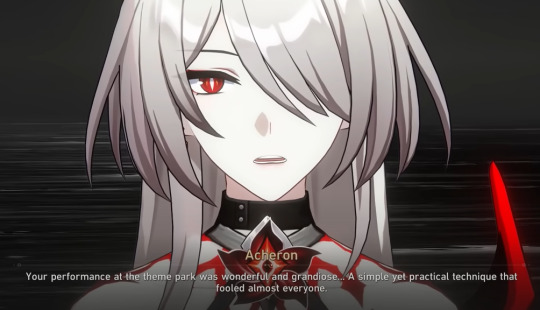
Not going to lie, the reason I started this post was specifically because I wanted to talk about how Acheron and Aventurine's dynamic was completely unexpected but actually fits flawlessly with the theme of feminine guidance in Aventurine's story.
Despite the fact that Aventurine made Acheron's life much harder and actively used her as a chip in his grand gamble, she doesn't blame or chastise him for those actions. Although she expresses some incredulity that Aventurine is actually that lucky, she then turns around and congratulations him for his ingenuity, immediately supporting him despite the fact that they don't even truly know each other.
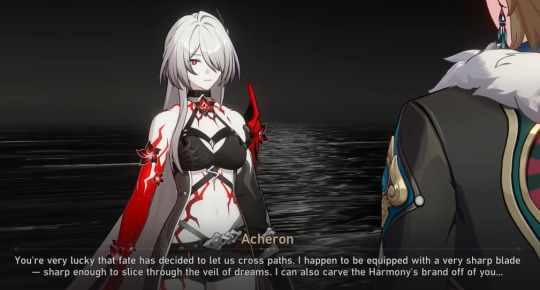
Then it gets even more interesting. Acheron, who frequently hits her companions with deep and sometimes very emotionally fraught questions, asks Aventurine: "Have you never wavered?"
We as players know for a fact that Aventurine is constantly wavering, constantly doubting himself, his luck, and whether he'll even live--or even wants to live--to see tomorrow. But we also know that Aventurine is not forthcoming about those truths, refusing to express them to anyone, even himself. The only way we hear those dark truths is through his "future" self (who by the way, is once again another male figure cutting Aventurine down--of course it's himself but it's also, from the player's perspective, once again reinforcing the message that he isn't going to find safety or kindness in an adult male presence). Aventurine almost constantly deflects and diverts when his emotions or struggles are brought to the fore (unless he's divulging them for the specific purpose of allowing someone else to weaponize them). "I'm fine," he says, like a lying liar who lies.
But he doesn't lie to Acheron.

He chooses to be completely candid with her, to lance open the deepest wound of his life--that he can win and win and win and still have lost everything. The glitz and the glamour has all been stripped away here, at the end of everything, and Aventurine finally feels safe enough to admit that he fears he has absolutely nothing in his life worth living for.
And then, we get this direct parallel: Aventurine looks to Acheron, the woman now before him, for guidance, for explanation, exactly as he looked to his sister in the past.
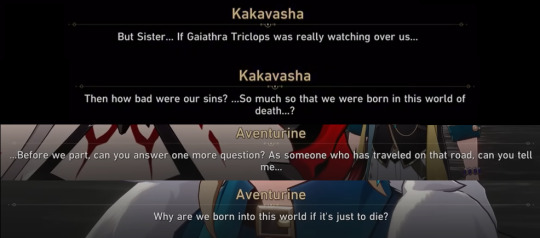
He needs help, he needs answers, and he is continually seeking that help from the female figures in his life, whose support and kindness echo the lost care of his mother and sister.
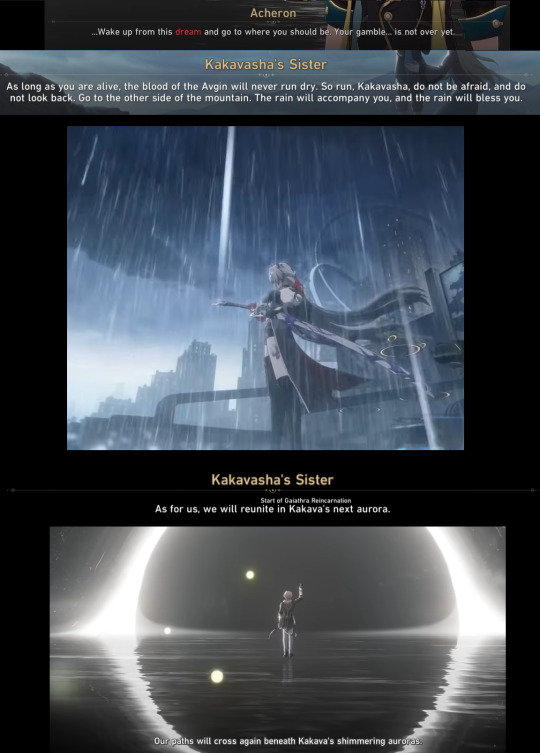
"Go where you should be," Acheron tells Aventurine, guiding him across the river of death just as his sister insisted that he flee through the rain toward life.
Look guys, Acheron's even the one who reminds Aventurine to look at Ratio's note in the first place because apparently being an emanator of Nihility gives you x-ray vision, but my girl just gets no credit at all for being Aventurine's real savior, come on now!! Yes, Ratio's note was the final reminder Aventurine needed that someone would be waiting for him on the other side, but Aventurine would never have even gotten to the point of being willing to read that note if Acheron hadn't stepped in and provided him an answer to his question.
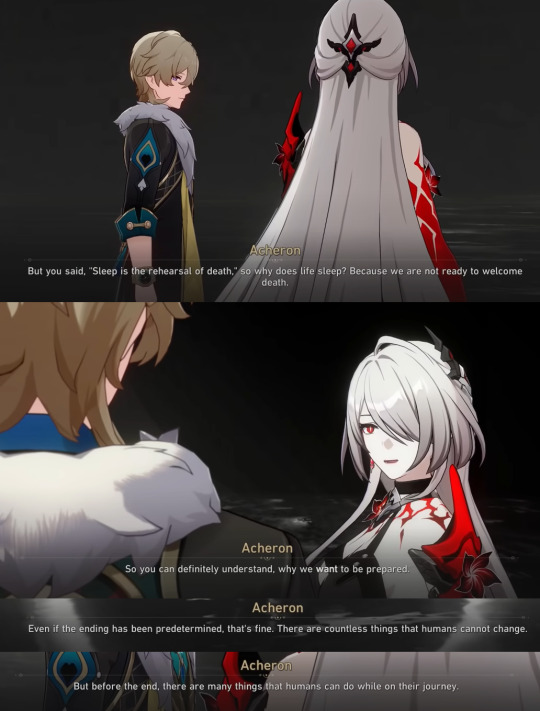
She feeds him back his own answer: "Why does life slumber? To rehearse the death for which we are not currently prepared." It is Acheron who reminds Aventurine that giving into the Nihility is pointless, and that rather than simply embracing a meaningless death, it is up to humanity itself to find and make meaning by living. It's this, not Ratio's note, that Aventurine gives as his reason for choosing to go on when asked by his own younger self. It's Acheron's words that finally give Aventurine an answer--why do we live just to die? Because there are people we can still make proud. Because when we go into death, we should do so with our heads held high, having achieved our own sense of purpose in this life.
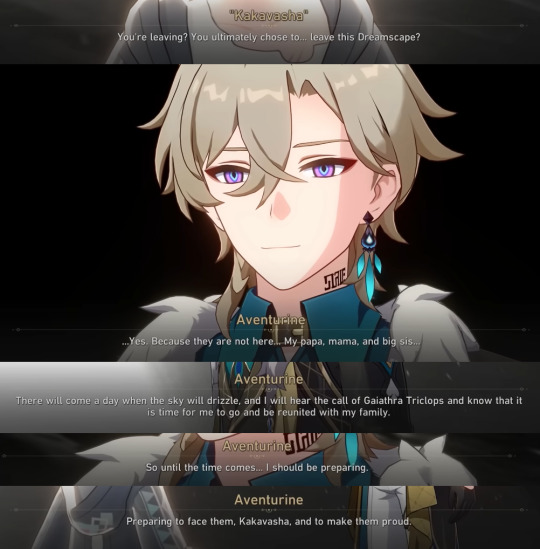
Ratio gave Aventurine a promise: Someone is waiting for you to come back.
But Acheron gave Aventurine a reason: If life is inherently meaningless, doesn't that just mean you are free to give it meaning yourself?
She saved him, as women have been saving him all his life.
Anyway, this has already been horrendously long, but really what I wanted to say is that I think it is absolutely fascinating how consistent Aventurine's writing is when it comes to portraying where his support comes from and who he seeks guidance from. (Psst, just in case you still haven't figured it out, it's women!) In virtually every instance we are shown, we see the message reinforced that women are Aventurine's greatest allies and role models, while male figures are continually positioned to intentionally or unintentionally let him down and cause him distress.
"But women playing the supporting role to a male character is nothing new, Star, why are you so excited by this?"
Because the role women are playing in Aventurine's life is not the subservient supporter and emotional crutch role that female characters all too often play to male counterparts. None of the women in Penacony or Aventurine's past were there to do the emotional labor for him, to be a trophy or prize, or to cater to his needs. They don't exist solely to help him fulfill his character motivations; they aren't following him around waiting for his next request as their only role in the plot.
Instead, with Aventurine's story, we almost have an inversion of gender roles, where the male character eschews the stereotypical "men are leaders, fighters, and stoic heroes" archetype. Instead, no matter how hard he tries to hide it and keep a stiff upper lip, it is clear from 2.0-2.1's story that Aventurine is a deeply insecure, lonely, and explicitly traumatized survivor of genocide, slavery, and exploitation. Unlike most male characters, who are very rarely portrayed as genuine victims--because come on, shouldn't men be strong enough to fight back? Shouldn't men be able to shrug it off when they are hurt, emotionally or physically? (Of course I'm rolling my eyes here!)--Aventurine is belittled, humiliated, emasculated, and victimized on-screen, roles almost exclusively reserved for women, for whom surviving victimization in fiction is seen as noble.
Meanwhile, the women in Aventurine's life take on the roles traditionally given to male characters. They're both emotionally and physically his protectors. Aventurine's sister gave her life to guard his safety; Acheron ensured he could safely pass beyond the river of Nihility into the Primordial Dreamscape. They give him the tools necessary to succeed where he could not succeed on his own. His plan could never have gotten off the ground without Topaz and Jade entrusting their Cornerstones to him. The knowledge and capabilities of the women around him--not their "feminine charms"--are what allow them to help keep Aventurine on the right path even though he does waver. Even women who disrespect him, like Sparkle, still play a positive role in his life, able to provide him insight gained with their own intellect and talents.
When he has no one to rely on and doesn't know what to do, Aventurine is able to continually turn to the women around him, asking for and receiving not servitude or fawning, but their genuine wisdom and guidance.
tl;dr: If nobody else has him, Aventurine knows this random woman he met two minutes ago on the street will have him, because the women in his life literally never let him down.
(It's just so, so good, and ultimately, it should be very clear why Aventurine's story is as popular with women as it is! A+, Hoyo!)
#honkai star rail#aventurine#acheron#topaz hsr#honkai star rail meta#character analysis#there's a bit of#ratiorine#in here too#but mostly I ramble about WOMEN#thematic parallels#thematic parallels everywhere#it's long#I'm sorry but not really#sometimes you act like a normal fan#other times you're me#and write essays that wouldn't be out of place in gender studies class#also I hit the '30 images per post' limit and had to make do#please ignore the terrible merging I did of the photos#don't perceive my MS Paint job
973 notes
·
View notes
Text






















Do you even know whether you're running toward or away from something anymore? I guess it's all just running, all the same.
| next
#the sims 4#ts4#ts4 screenshots#ts4 alpha#ts4 edits#ts4 story#The Journey Forward#ch: Sabrina#so i'm def not committing to full time storytelling again bc I SIMPLY do not have it in me#HOWEVER#i'm going to get this damn book done one way or another#and if that means recreating every major scene in the sims to do so then SO BE IT#if anyone remembers any of the many iterations of this scene i've played around with over the years (including the original)#let me kith u#this is my first real utilization of the increased picture limit on here and lemme tell u#i'm about to be a PROBLEM#where was this when i was in my storytelling prime#anyway i'm v happy with how this came out#although i am not happy to retraumatize Bri once again#the story's changed a lot but there's still a ton that remains the same#bc honestly the bones of this story are still etched into my soul#it just need a little...refining#and i rly hope if i have any former readers that are still around that you guys like the changes i've made#and i'm really excited to have y'all along for the journey forward#har har see what i did thar#i think that's my cue to skedaddle#i'll see myself out
218 notes
·
View notes
Text


You know you can always come here if you're in need, son.
#iwtv#iwtvedit#interview with the vampire#louis de pointe du lac#jacob anderson#sorry these gifs are low quality i'm obsessed with the acting choices here & had to try to capture them#despite my limited abilities#god. it's so painful.#he's doing so fucking bad! the rage the sorrow etc.#the smile and look away. it breaks my heart every fucking time.#anyway. agony that i have inflicted upon myself.#😭😭😭😭
250 notes
·
View notes
Text
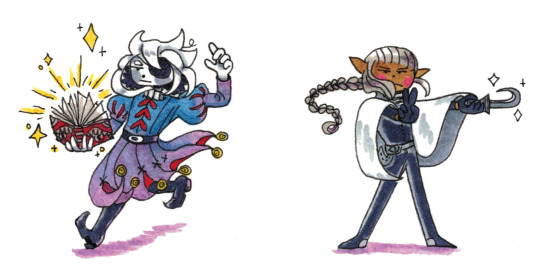
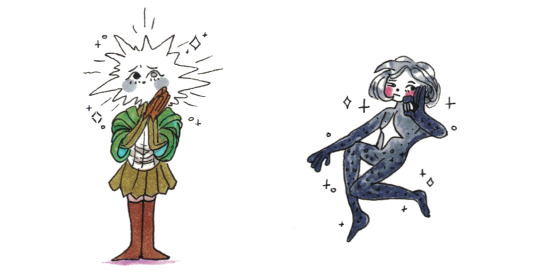
ISAT & Dungeon Meshi swap!
#in stars and time#ISAT#Siffrin#Loop#Dungeon Meshi#Thistle#Mithrun#This is incredibly self indulgent art but I've been doing commissions for other people - I can have this treat.#Two series that have me in a death grip right now and boy did the realization of the parallels between these characters hit hard.#Siffrin and Thistle are the “Forgot what it was all for” duo. The “I'm scared to let it go (it must be let go)” duo.#Loop and Mithrun are [REDACTED] [GO CHECK OUT THESE SERIES SPOILER FREE]#God I have so much to say about the Loop and Mithrun parallels. I won't here because I refuse to spoil people on ISAT.#What I *will* say is that both these characters had a similar curve in my interest in them.#Which is “I was ambivalent until the near end - where they then shot up to become some of my favourite characters ever.”#We love characters with an incredible arc that reframes them so intensely that you the reader will never be the same after.#Anyways! (rotates both these crossovers in my head at a rapid orbit and gazes at them fondly).#This is my sandbox and I get to eat the sand!!!#I've got some MDZS/ISAT swap content coming soon as well. My sand eating knows no limits apparently.
577 notes
·
View notes
Text
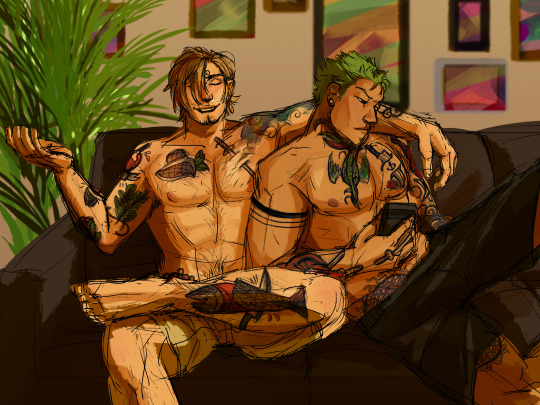


a few months ago giffy was like "haha hear me out, what if tattoo au" and then we blacked out and talked about nothing else for like three weeks
#my art#one piece tag#zosan#if you've been here since 2012 then a) i'm sorry. thank you for your service. b) PLEASE have a Sensible Fucking Chuckle with me about this#honest to god the ufnniest possible thing that i personally could have done in the year 2023#if you're wondering what happened in 2012 then please leave that stone unturned. tghank you#anyways this whole thing brings me INSURMOUNTABLE joy ask me any question about anyone and i am sure i will have an answer#we have meanings or reasons for just about everything visible here and uhhhhh soooo so so so much more (ask me questions.. ask me....)#fitting the general fuckbonkers insanity of one piece into a modern au was both challenging (fun!) and INCREDIBLY hilarious#giffy is the funniest fucking person on the planet for coming up with half the situations that we shoved everyone into#(i did these in.. october i think?? maybe earlier? during the time i limited myself to sketches only)#tattoo au tag
494 notes
·
View notes
Text
Double Indemnity, Veritas Ratio and Aventurine

This was originally a part of my compilation post as a short analysis on the Double Indemnity references, linking to this great thread by Manya on Twitter. However, I've recently watched the movie and found that the parallels run much deeper than just the mission name and the light cone itself, plus as the short synopsis I've read online. Since there isn't really an in-depth attempt at an analysis on the film in relation to the way Aventurine and Ratio present themselves throughout Penacony, I thought I'd take a stab at doing just that. I will also be bringing up things from Manya's thread as well as another thread that has some extra points.
Disclaimer that I... don't do analyses very often. Or write, in general — I'm someone who likes to illustrate their thoughts (in the artistic sense) more than write. There's just something about these two that makes me want to rip into them so badly, so here we are. If there's anything you'd like to add or correct me on, feel free to let me know in the replies or reblogs, or asks. This ended up being a rather extensive deep dive into the movie and its influences on the pairing, so please keep that in mind when pressing Read More.
There are two distinct layers on display in Ratio and Aventurine's relationship throughout Penacony, which are references to the two most important relationships in the movie — where they act like they hate/don’t know each other, and where they trust each other.
SPOILER WARNING for the entire movie, by the way. You can watch the film for free here on archive.org, as well as follow along with the screenplay here. I will also be taking dialogue and such from the screenplay, and cite quotes from the original novel in its own dedicated section. SPOILER WARNING for the Cat Among Pigeons Trailblaze mission, as well.

CONTENT WARNING FOR MENTIONS OF SUICIDE. YOU HAVE BEEN WARNED.
To start, Double Indemnity (1944) is a film noir by Billy Wilder (and co-written by Raymond Chandler) based on the novel of the same name by James M. Cain (1927). There are stark differences between the movie adaptation and the original novel which I will get into later on in this post, albeit in a smaller section, as this analysis is mainly focused on the movie adaptation. I will talk about the basics (summaries for the movie and the game, specifically the Penacony mission in tandem with Ratio and Aventurine) before diving into the character and scene parallels, among other things.

—
[THE NAME]
The term "double indemnity" is a clause in which if there’s a case of accidental death of a statistically rare variety, the insurance company has to pay out multiple of the original amount. This excludes deaths by murder, suicide, gross negligence, and natural causes.

The part of the mission in Cat Among Pigeons where Ratio and Aventurine meet with Sunday is named after the movie. And before we get further into things, let's get this part out of the way: The Chinese name used in the mission is the CN title of the movie, so there's no liberties taken with the localization — this makes it clear that it’s a nod to the movie and not localization doing its own thing like with the mission name for Heaven Is A Place On Earth (EN) / This Side of Paradise (人间天堂) (CN).

—
[SUMMARY OF THE 1944 MOVIE]
Here I summarised the important parts that will eventually be relevant in the analysis related to the game.

Insurance salesman Walter Neff, wounded from a gunshot, enters his office and confesses his crime on a dictaphone to his boss Barton Keyes, the claims manager. Much earlier, he had met Phyllis Dietrichson, the wife of Mr. Dietrichson and former nurse. Neff had initially wanted to meet Mr. Dietrichson because of car insurance. Phyllis claims her husband is mean to her and that his life insurance goes to his daughter Lola. With Neff seduced by Phyllis, they eventually brew up a scheme to murder Mr. Dietrichson in such a way that they activate the "double indemnity" clause, and the plan goes off almost perfectly. Initially, the death is labeled a suicide by the president of the company, Norton.
Keyes finds the whole situation suspicious, and starts to suspect Phyllis may have had an accomplice. The label on the death goes from accidental, to suicide, to then murder. When it’s ruled that the husband had no idea of the accidental policy, the company refuses to pay. Neff befriends Phyllis’ stepdaughter Lola, and after finding out Phyllis may have played a part in the death of her father’s previous wife, Neff begins to fear for Lola and himself, as the life insurance would go all towards her, not Phyllis.
After the plan begins to unravel as a witness is found, it comes out that Lola’s boyfriend Nino Zachette has been visiting Phyllis every night after the murder. Neff goes to confront Phyllis, intending to kill her. Phyllis has her own plans, and ends up shooting him, but is unable to fire any more shots once she realises she did love him. Neff kills her in two shots. Soon after telling Zachette not to go inside the house, Neff drives to his office to record the confession. When Keyes arrives, Neff tells him he will go to Mexico, but he collapses before he could get out of the building.
—
[THE PENACONY MISSION TIMELINE]

I won’t be summarising the entirety of Aventurine and Ratio’s endeavours from the beginning of their relationship to their final conversation in Heaven Is A Place On Earth the same way as I summarised the plot of the movie, so I will instead present a timeline. Bolded parts means they are important and have clear parallels, and texts that are in [brackets] and italics stand for the names of either the light cone, or the mission names.
[Final Victor] Their first meeting. Ratio’s ideals are turned on its head as he finally meets his match.
Several missions happen in-between their first encounter and the Penacony project. They come to grow so close and trusting with each other that they can guess, understand each other’s thoughts, way of thinking and minds even in high stakes missions. Enough to pull off the Prisoner’s Dilemma (Aventurine’s E1) and Stag Hunt Game (Aventurine’s E6) and come out on top.
Aventurine turns towards Ratio for assisting him in the Penacony project. Ratio's involvement in the project is implied to be done without the knowledge of Jade, Topaz, and the IPC in general, as he was only sent to Penacony to represent the Intelligentsia Guild, and the two other Stonehearts never mention Ratio.
Aventurine and Ratio cook up the plan to deceive Sunday before ever setting foot on Penacony. Aventurine does not tell Ratio the entirety of his plan.
Aventurine convinces Topaz and Jade to trust him with their Cornerstones. Aventurine also breaks his own Cornerstone and hides it along with the jade within a bag of gift money.
[The Youth Who Chase Dreams] They enter Penacony in the Reverie Hotel. Aventurine is taken to the side by Sunday and has all his valuables taken, which includes the gift money that contains the broken aventurine stone, the jade, and the case containing the topaz.
Aventurine and Ratio speak in a “private” room about how Aventurine messed up the plan. After faking an argument to the all-seeing eyes of Sunday, Ratio leaves in a huff.
Ratio, wearing his alabaster head, is seen around Golden Hour in the (Dusk) Auction House by March 7th.
[Double Indemnity] Ratio meets up with Sunday and “exposes” Aventurine to him. Sunday buys his “betrayal”, and is now in possession of the topaz and jade. Note that this is in truth Ratio betraying Sunday all along.
Ratio meets up with Aventurine again at the bar. Ratio tells Aventurine Sunday wants to see him again.
They go to Dewlight Pavilion and solve a bunch of puzzles to prove their worth to Sunday.
They meet up with Sunday. Sunday forces Aventurine to tell the truth using his Harmony powers. Ratio cannot watch on. It ends with Aventurine taking the gift money with his Cornerstone.
[Heaven Is A Place On Earth] They are in Golden Hour. Ratio tries to pry Aventurine about his plan, but Aventurine reins him in to stop breaking character. Ratio gives him the Mundanite’s Insight before leaving. This is their final conversation before Aventurine’s grandest death.
Now how exactly does the word “double indemnity” relate to their mission in-game? What is their payout? For the IPC, this would be Penacony itself — Aventurine, as the IPC ambassador, handing in the Jade Cornerstone as well as orchestrating a huge show for everybody to witness his death, means the IPC have a reason to reclaim the former prison frontier. As for Ratio, his payout would be information on Penacony’s Stellaron, although whether or not this was actually something he sought out is debatable. And Aventurine? It’s highly implied that he seeks an audience with Diamond, and breaking the Aventurine Cornerstone is a one way trip to getting into hot water with Diamond. With Aventurine’s self-destructive behaviour, however, it would also make sense to say that death would be his potential payout, had he taken that path in the realm of IX.
Compared to the movie, the timeline happens in reverse and opposite in some aspects. I will get into it later. As for the intended parallels, these are pretty clear and cut:
Veritas Ratio - Walter Neff
Aventurine - Phyllis Dietrichson
Sunday - Mr. Dietrichson

There is one other character who I feel also is represented in Ratio, but I won’t bring them up until later down the line.
For the sake of this analysis, I won’t be exploring Sunday’s parallel to Mr. Dietrichson, as there isn’t much on Dietrichson’s character in the first place in both the movie and the novel. He just kind of exists to be a bastard that is killed off at the halfway point. Plus, the analysis is specifically hyper focused on the other two.
—
[SO, WHAT’S THE PLAN?]
To make things less confusing in the long run whenever I mention the words “scheme” and “plan”, I will be going through the details of Phyllis and Neff’s scheme, and Aventurine and Ratio’s plan respectively. Anything that happens after either pair separate from another isn’t going to be included. Written in a way for the plans to have gone perfectly with no outside problems.

Phyllis and Neff —> Mr. Dietrichson
Goal: Activate the double indemnity clause by killing Mr. Dietrichson and making it look like a freak train accident
Payout: Twice or more of the face value of the life insurance ($100,000)
Main Actor: Walter Neff | Accomplice: Phyllis Dietrichson
During the entire time until the payout, Phyllis and Neff have to make sure to any outsiders that they look like complete strangers instead of lovers in an affair.
Step-by-step:
Neff convinces Mr. Dietrichson to sign the policy with the clause without him suspecting foul play, preferably with a third party to act as an alibi. This is done discreetly, making Mr. Dietrichson not read the policy closely and being told to just sign.
Neff and Phyllis talk to each other about small details through the phone (specified to be never at Phyllis’ own house and never when Neff was in his office) and in the marketplace only, to make their meetings look accidental. They shouldn’t be seen nor tracked together, after all.
Phyllis asks Mr. Dietrichson to take the train. She will be the one driving him to the train station.
On the night of the murder, after making sure his alibi is airtight, Neff sneaks into their residence and hides in their car in the second row seating, behind the front row passenger seat. He wears the same colour of clothes as Mr. Dietrichson.
Phyllis and Mr. Dietrichson get inside the car — Phyllis in the driver’s seat and Mr. Dietrichson in the passenger seat. Phyllis drives. On the way to the train station, she makes a detour into an alley. She honks the horn three times.
After the third honk, Neff breaks Mr. Dietrichson’s neck. The body is then hidden in the second row seating under a rug.
They drive to the train station. Phyllis helps Neff, now posing as Mr. Dietrichson, onto the train. The train leaves the station.
Neff makes it to the observation platform of the parlour car and drops onto the train tracks when nobody else is there.
Phyllis is at the dump beside the tracks. She makes the car blink twice as a signal.
The two drag Mr. Dietrichson’s corpse onto the tracks.
They leave.
When Phyllis eventually gets questioned by the insurance company, she pretends she has no idea what they are talking about and eventually storms off.
Phyllis and Neff continue to lay low until the insurance company pays out.
Profit!
Actual Result: The actual murder plan goes almost smoothly, with a bonus of Mr. Dietrichson having broken a leg. But with him not filing a claim for the broken leg, a witness at the observation platform, and Zachette visiting Phyllis every night after the murder, Keyes works out the murder scheme on his own, but pins the blame on Phyllis and Zachette, not Neff.

Now for Aventurine and Ratio. You can skip this section if you understand how deep their act goes, but to those who need a refresher, here’s a thorough explanation:
Aventurine and Ratio —> Sunday
Goal: Collect the aventurine stone without Sunday knowing, ruin the dream (and create the grandest death)
Payout: Penacony for the IPC, information on the Stellaron for Ratio, a meeting with Diamond / death for Aventurine
Main Actor: Aventurine | Accomplice: Veritas Ratio
From the moment they step onto Penacony, they are under Sunday’s ever present and watchful eyes. “Privacy” is a foreign word to The Family. They have to act like they don’t like each other’s company the entire time and feed Sunday information through indirect means so that the eventual “betrayal” by Ratio seems truthful to Sunday. Despite what it looks like, they are closer than one would ever think, and Ratio would never sell out a person purely for information.
Step-by-step:
After Sunday takes away the bag of gift money and box, Aventurine and Ratio talk in a room in the Reverie Hotel.
Aventurine establishes the Cornerstones’ importance, and how he lost the gift money and the case containing the Cornerstones to Sunday. Ratio turns to leave, saying “some idiot ruined everything”, meaning the Cornerstones were vital to their plan. (Note that Ratio is not wearing his alabaster head while saying it to said “idiot”.)
Aventurine then proceeds to downplay the importance of the Cornerstones, stating they are “nothing more than a few rocks” and “who cares if they are gone”. This lets Sunday know that something suspicious may be going on for him to act like it’s nothing, and the mention of multiple stones, and leaves him to look up what a Cornerstone is to the Ten Stonehearts of the IPC.
Ratio points out his absurd choice of outfit, mentioning the Attini Peacock and their song.
Ratio implies that without the aventurine stone, he is useless to the IPC. He also establishes that Aventurine is from Sigonia(-IV), and points out the mark on his neck. To Sunday, this means that Aventurine is shackled to the IPC, and how Aventurine may possibly go through extreme lengths to get the stone back, because a death sentence always looms above him.
Aventurine claims Ratio had done his homework on his background, which can be taken that this is their very first time working together. (It isn’t, and it only takes one look to know that Aventurine is an Avgin because of his unique eyes, so this comment does not make sense even in a “sincere” way, a running theme for the interaction.)
Ratio mentions how the true goal is to reclaim Penacony for the IPC, establishing their ulterior motive for attending the banquet.
Ratio asks if Aventurine went to pre-school in Sigonia after saying trust was reliant on cooperation. Aventurine mentions how he didn’t go to school and how he doesn’t have any parents. He even brings up how friends are weapons of the Avgins. This tells Sunday that the Avgins supposedly are good at manipulation and potentially sees Ratio possibly betraying Aventurine due to his carelessness with his “friends”. Sunday would also then research about the Avgins in general (and research about Sigonia-IV comes straight from the Intelligentsia Guild.)
Ratio goes to Dewlight Pavilion in Sunday’s Mansion and exposes a part of Aventurine’s “plan”. When being handed the suitcase, Ratio opens it up due to his apparent high status in the IPC. He tells Sunday that the Cornerstone in the suitcase is a topaz, not an aventurine, and that the real aventurine stone is in the bag of gift money. This is a double betrayal — on Aventurine (who knows) and Sunday (who doesn’t). Note that while Ratio is not officially an IPC member in name — the Intelligentsia Guild (which is run by the IPC head of the Technology Department Yabuli) frequently collaborates with the IPC. Either Aventurine had given him access to the box, or Ratio’s status in general is ambiguous enough for Sunday not to question him further. He then explains parts of Aventurine’s gamble to Sunday in order to sell the betrayal. Note that Ratio does not ever mention Aventurine’s race to Sunday.
Ratio brings Aventurine to Sunday. Aventurine offers help in the investigation of Robin's death, requesting the gift money and the box in return.
Sunday objects to the trade offer. Aventurine then asks for just the bag. A classic car insurance sales tactic. Sunday then interrogates Aventurine, and uses everything Ratio and Aventurine brought up in the Reverie Hotel conversation and their interactions in the Mansion, as well as aspects that Ratio had brought up to Sunday himself.
Aventurine feigns defeat and ignorance enough so that Sunday willingly lets him go with the gift bag. After all is said and done, Aventurine leaves with the gift money, where the Aventurine Cornerstone is stored all along.
Ratio and Aventurine continue to pretend they dislike each other until they go their separate ways for their respective goals and plans. Aventurine would go on to orchestrate his own demise at the hands of Acheron, and Ratio… lurks in the shadows like the owl he is.
Profit!
Actual Result: The plan goes perfectly, even with minor hiccups like Ratio coming close to breaking character several times and Aventurine being sentenced to execution by Sunday.
This is how Sunday uses the information he gathered against Aventurine:
• Sunday going on a tirade about the way Aventurine dresses and how he’s not one to take risks — Ratio’s comment about Aventurine’s outfit being peacock-esque and how he’s “short of a feather or two”. • “Do you own a Cornerstone?” — Ratio talked about the aventurine stone. • “Did you hand over the Cornerstone to The Family when you entered Penacony?” — Aventurine mentioned the box containing the Cornerstones. • “Does the Cornerstone you handed over to The Family belong to you?” — Aventurine specifically pluralized the word Cornerstone and “a bunch of rocks” when talking to Ratio. • “Is your Cornerstone in this room right now?” — The box in the room supposedly contained Aventurine’s own cornerstone, when Aventurine mentioned multiple stones. • “Are you an Avgin from Sigonia?” —Aventurine mentioned that he’s an Avgin, and Ratio brought up Sigonia. • “Do the Avgins have any ability to read, control, and manipulate one’s own or another’s minds?” — Aventurine’s comment on how friends are weapons, as well as Sunday’s own research on the Avgins, leading him to find out about the negative stereotypes associated with them. • “Do you love your family more than yourself?” — His lost parents. “All the Avgins were killed in a massacre. Am I right?” — Based on Sunday’s research into his background. • “Are you your clan’s sole survivor?” — Same as the last point. “Do you hate and wish to destroy this world with your own hands?” — Ratio mentioned the IPC’s goal to regain Penacony, and Aventurine’s whole shtick is “all or nothing”. • “Can you swear that at this very moment, the aventurine stone is safe and sound in this box?” — Repeat.
As seen here, both duos have convoluted plans that involve the deception of one or more parties while also pretending that the relationship between each other isn’t as close as in reality. Unless you knew both of them personally and their histories, there was no way you could tell that they have something else going on.
On to the next point: Comparing Aventurine and Ratio with Phyllis and Neff.
—
[NEFF & PHYLLIS — RATIO & AVENTURINE]

With the short summaries of the movie and the mission out of the way, let’s look at Phyllis and Neff as characters and how Aventurine and Ratio are similar or opposite to them.

Starting off with Aventurine and Phyllis. Here is where they are the most similar:
Phyllis is blonde and described as a provocative woman. Aventurine is also a blond and eyes Ratio provocatively in the Final Victor light cone.
Phyllis was put under surveillance after Keyes starts figuring out that the so-called accidental death/suicide may have been a murder after all. Similarly, Aventurine was watched by Sunday the entire time in Penacony.
Phyllis never tells Neff how she's seeing another man on the side to possibly kill him too (as well as how she was responsible for the death of her husband‘s previous wife). Aventurine also didn't tell Ratio the entirety of his plan of his own death.
Phyllis puts on a somewhat helpless act at first but is incredibly capable of making things go her way, having everything seemingly wrapped around her finger. Aventurine — even when putting on a facade that masks his true motives — always comes out at the top.
Now the differences between Aventurine and Phyllis:
Phyllis does not care about her family and has no issue with killing her husband, his previous wife, and possibly her daughter Lola. Opposite of that, Aventurine is a family man… with no family left, as well as feeling an insane level of survivor’s guilt.
Really, Phyllis just… does not care at all about anyone but herself and the money. Aventurine, while he uses every trick in the book to get out on top, does care about the way Jade and Topaz had entrusted him with their Cornerstones, in spite of the stones being worth their lives.
Phyllis also uses other people to her advantage to get what she wants, often behind other people's backs, with the way she treats Neff and Zachette. Aventurine does as well (what with him making deals with the Trailblazer while also making a deal with Black Swan that involves the Trailblazer). The difference here is Phyllis uses her allure deliberately to seduce men while Aventurine simply uses others as pawns while also allowing others to do the same to himself.
Phyllis makes no attempt at compromising the policy when questioned by Norton. Aventurine ends up compromising by only taking the gift money (which is exactly what he needs).
The wig that Barbara Stanwyck (the actress of Phyllis) wore was chosen to make her look as “sleazy” as possible, make her look insincere and a fraud, a manipulator. A sort of cheapness. Aventurine’s flashy peacock-esque outfit can be sort of seen as something similar, except the outfit isn’t cheap.

Moving on to Ratio’s similarities to Neff… There isn’t much to extrapolate here as Ratio is more of a side character in the grand scheme of Penacony, however this is what I’ve figured out.
Neff has dark hair. Ratio has dark purple hair.
Neff almost never refers to Phyllis by her name when speaking with her, only as “baby”. The few times he refers to her as Phyllis or Mrs. Dietrichson is during their first conversations and when he has to act like he doesn’t know her. Ratio never calls Aventurine by his name when he’s around him — only as “gambler”, sometimes “damned” or “dear” (EN-only) gambler. Only in the Aventurine's Keeping Up With Star Rail episode does Ratio repeatedly say his name, and yet he still calls him by monikers like “gambler” or, bafflingly, a “system of chaos devoid of logic”.
Both Neff and Ratio committed two betrayals: Neff on Mr. Dietrichson and Keyes, and Ratio on Sunday and Aventurine. With the former cases it was to reach the end of the trolley line, and with the latter it was on a man who had put his trust in him.
As for the differences…
Neff is described as someone who’s not smart by his peers. Ratio is someone who is repeatedly idolised and put on a pedestal by other people.
Neff is excellent at pretending to not know nor care for Phyllis whenever he speaks about her with Keyes or when he and she are in a place that could land them in hot water (the office, the mansion when there are witnesses). His acting is on the same level as Phyllis. With Ratio it’s… complicated. While he does pull off the hater act well, he straight up isn’t great at pretending not to care about Aventurine’s wellbeing.
Instead of getting his gunshot wound treated in the hospital like a normal person, Neff makes the absolutely brilliant decision of driving to his office and talking to a dictaphone for hours. Needless to say, this is something a medical doctor like Ratio would never do.

Now here's the thing. Though it's very easy to just look at Phyllis and Neff in the movie and go "okay, Aventurine is Phyllis and Ratio is Neff — end of story" and leave it at that, I find that they both take from the two leads in different ways. Let me explain. Beginning with Aventurine and Neff…
Neff is the one who hatches the plan and encourages Phyllis to go through and claim the double indemnity clause in the first place. He is also the key player of his own risky plan, having to fake being the husband to enter the train as well as fake the death. Aventurine puts himself at great risk just by being in Sunday’s presence, and hoping that Sunday wouldn’t figure out that the green stone he had uncovered wasn’t the aventurine stone.
Adding onto the last point, Neff had fantasised about pulling off the perfect murder for a long time — the catalyst was simply him meeting Phyllis. Aventurine presumably sought out Ratio alone for his plan against Sunday.
Neff makes a roulette wheel analogy and talks about a pile of blue and yellow poker chips (the latter in the script only). I don‘t even have to explain why this is relevant here. (Aventurine’s Ultimate features a roulette wheel and the motif is on his belt, thigh strap, and back, too. And of course, Aventurine is all about his chips.)
Neff has certain ways to hide when he’s nervous, which include hiding his hands in his pockets when they were shaking, putting on glasses so people couldn’t see his eyes. Aventurine hides his left hand behind his back when he’s nervous: Future Aventurine says that "they don't know the other hand is below the table, clutching [his] chips for dear life", and in multiple occasions such as the Final Victor LC, his character trailer, and even in his boss form in the overworld you can see that Aventurine hides his left hand behind his back. And he is also seen with his glasses on sometimes.
Neff says a bunch of stuff to make sure that Phyllis acts her part and does not act out of character (i.e. during their interactions at the market), like how Aventurine repeatedly tries to get Ratio back on track from his subpar acting.
Neff is always one step ahead of the game, and the only reason the plan blows up in his face is due to outside forces that he could not have foreseen (a witness, Keyes figuring out the plan, the broken leg). Aventurine meanwhile plays 5D chess and even with the odds against him, he uses everything he can to come out on the top (i. e. getting Acheron to kill him in the dream).
Even after coming home on the night of the murder, Neff still felt that everything could have gone wrong. Aventurine, with his blessed luck, occasionally wavers and fears everything could go wrong whenever he takes a gamble.
Neff was not put under surveillance by Keyes due to him being extensive with his alibi. After witnessing Robin’s death with eyewitnesses at the scene, the Family had accepted Aventurine’s alibi, though he would be under watch from the Bloodhounds according to Ratio.
Neff talks about the entire murder scheme to the dictaphone. Aventurine during Cat Among Pigeons also retells his plan, albeit in a more convoluted manner, what with his future self and all.

Continuing with Ratio and Phyllis, even with their personalities and motivations being quite different, they do have a few commonalities.
Phyllis was a nurse. Ratio is a medical doctor.
Her name is Greek of origin. Veritas Ratio, though his name is Latin, has Greco-Roman influences throughout his entire character.
The very first scene Phyllis appears in has her wearing a bath towel around her torso. Ratio loves to take baths to clear his mind.
Phyllis was instructed by Neff to be at the market every morning at eleven buying things. Ratio is seen in an auction house with his alabaster head on so no one could recognize him.
Phyllis mostly acts as an accomplice to the scheme, being the one to convince her husband to take the train instead. She is also generally seen only when Neff is involved. Ratio plays the same role as well, only really appearing in the story in relation to Aventurine as well as being the accomplice in Aventurine’s own death. Even him standing in the auction house randomly can be explained by the theory that he and Aventurine had attempted to destabilise Penacony’s economy through a pump and dump scheme.
With these pointers out of the way, let’s take a closer look at select scenes from the film and their relation to the mission and the pair.
—
[THE PHONE CALL — THE REVERIE HOTEL]

Before the murder, there is a scene with a phone call between Phyllis and Neff discussing the plan while Keyes is in the same room as Neff. Neff has to make sure that Keyes doesn’t think of anything of the phone call, so he acts like he’s calling a “Margie”, and says a bunch of stuff that sounds innocent out of context (“Can’t I call you back, ‘Margie’?” “What color did you pick out?” “Navy blue. I like that fine”), but are actually hinting at the real plan all along (the suit that Mr. Dietrichson wears.)
In a roundabout way, the conversation between Ratio and Aventurine in the Reverie Hotel can be seen as the opposite of that scene — with the two talking about their supposed plan out loud on Penacony ground, a place where the Family (and in turn, Sunday) has eyes everywhere. Despite being in a “private” room, they still act like they hate each other while airing out details that really do not make sense to air out if they really did meet the first time in Penacony (which they didn’t — they’ve been on several missions beforehand). It’s almost like they want a secret third person to know what they were doing, instead of trying to be hushed up about it. The TVs in the room that Sunday can look through based on Inherently Unjust Destiny — A Moment Among The Stars, the Bloodhound statue that disappears upon being inspected, the owl clock on the left which side eyes Ratio and Aventurine, all point to that Sunday is watching their every move, listening to every word.
Rewinding back to before the phone call, in one of the encounters at the marketplace where they “accidentally” run into each other, Phyllis talks about how the trip was off. How her husband wouldn’t get on the train, which was vital for their plan, because of a broken leg. All this, while pretending to be strangers by the passersby. You could say that the part where Ratio almost leaves because Aventurine had “ruined the plan” is the opposite of this, as the husband breaking his leg was something they couldn’t account for, while Aventurine “being short of a few feathers” was entirely part of the plan.
—
[QUESTIONING PHYLLIS — THE INTERROGATION]

This section is going to be a little longer as I will cover two scenes in the movie in a more detailed manner — Mr. Dietrichson signing the policy, and Phyllis being questioned — and how they are represented in the Sunday-Aventurine interrogation and the prior conversation between Ratio and Sunday in multitudes of ways.
Going about their plan, Neff has to make sure that Mr. Dietrichson signs the policy with the double indemnity clause without him knowing the details, all the while having Phyllis (and Lola) in the same room. He and Phyllis have to pretend that they don’t know each other, and that this is just the standard accidental insurance process, instead of signing what would be his downfall. To sell it, he gets Mr. Dietrichson to sign two “copies” of the form, except with Mr. Dietrichson’s second signature, he’s duped into signing the accident insurance policy with the respective clause.
You can tie this to how Ratio goes to Sunday in order to “expose” the lie that the suitcase didn’t actually contain the Aventurine Cornerstone, as well as there being more than one Cornerstone involved in the scheme. Ratio must make sure that Sunday truly believes that he dislikes Aventurine’s company, while also making sure that Sunday doesn’t figure out the actual aventurine stone is broken and hidden in the gift bag. The scheme turns out to be successful, as Sunday retrieves the two Cornerstones, but not the aventurine stone, and truly does think that the green stone he has in his possession is the aventurine.

This whole scene with Sunday is also reminiscent of the interrogation scene in the middle of the movie, where Phyllis was questioned by the boss (Norton) who was deducing that Mr. Dietrichson's death was a suicide, not accidental death. Neff, Phyllis, Keyes and Norton were all in the same room, and Neff and Phyllis had to act like they never knew the other. Phyllis acts like she knows nothing about what Norton insinuates about her husband and eventually, Phyllis explodes in anger and storms out the room, even slamming the door. Her act is very believable to any outsider.

Now back to the Ratio and Sunday conversation. One glaring difference between the movie and here is that his acting isn’t great compared to either Phyllis nor Neff. It never was throughout the Penacony mission. He even comes very close to breaking character several times, and is even defending Aventurine in a somewhat aggressive manner during his one-on-one conversation with Sunday, as in he literally tells Sunday to see a shrink. It’s very different from the way he was acting in Herta Space Station — like Ratio cares about Aventurine too much to keep his hands off.
It's also worth pointing out that Neff doesn't speak a word when Phyllis was being interrogated. Similarly, Ratio is silent throughout the entire scene with Sunday and Aventurine, with his only “line” being a “hm”. When Aventurine calls him a wretch to his face, all he does is look to the side. In fact, he can only look at Aventurine when the other isn’t staring back. Almost like him uttering a single word would give them away. Or his acting is terrible when it has to do with Aventurine, as he has no issue doing the same thing in Crown of the Mundane and Divine (Mundane Troubles).
So, Sunday finds out about the Cornerstones and reveals them to Aventurine, and reasons that he cannot give them back to him because Aventurine had lied. Note that in that same scene, Aventurine attempted to use the two murders that had occurred beforehand against Sunday to retrieve his own cornerstone. Similarly, when it was revealed that Mr. Dietrichson did not know about the accident policy and that the so-called “accidental death” was not, in fact, accidental, the insurance company refused to pay out the money.
Unlike the movie, this was all planned, however. The double-crossing by Ratio, the gift money being the only thing required for Aventurine’s real plan. All of it was an act of betrayal against Sunday, in the same manner as the meticulous planning as Mr. Dietrichson’s murder — To sign the policy, get him to take the train, kill him on the way, and to have Neff pose as the husband on the train until the time is right to get off and lay the body on the tracks. A key difference is that they could not have expected their scheme to be busted wide open due to forces outside of their control, while Ratio and Aventurine went straight down the line for the both of them no matter what.
From here on out, we can conclude that the way Ratio and Aventurine present themselves in Penacony to onlookers is in line with Neff and Phyllis.
—
[“GOODBYE, BABY” — FINAL VICTOR]

And now for the (in)famous light cone, Final Victor. The thing that truly kickstarted the Ratio and Aventurine ship in the fanbase, and the partnership between the two in general. It’s a direct reference to the final confrontation between Neff and Phyllis in the movie.
I’ll fire through all the similarities between the two scenes.
During the respective scenes, Aventurine and Phyllis both outsmart their partner one way or the other: Aventurine with his one-sided game of Russian Roulette, and Phyllis hiding her gun underneath the cushions until Neff turned away.
The guns are owned by Phyllis and Aventurine, not Neff and Ratio.
Phyllis couldn’t bring herself to fire any more shots after she realised she truly did love Neff. Ratio could do nothing but watch as Aventurine did what he did — he couldn’t even pull away if the LC animation is anything to go by him struggling as Aventurine firmly keeps the gun to his chest.
Neff says he doesn’t buy (believe) that Phyllis loved him. She then goes “I’m not asking you to buy […]”. The LC description has Aventurine ask Ratio “You don’t believe me?”, while in the LC animation Ratio straight up says “You expect me to believe you?” and Aventurine answering “Why not, doctor/professor?”
The visual composition of the LC and the scene are nearly identical, from the lighting to the posing to the way Aventurine looks at Ratio — Aventurine and Ratio are even wearing different outfits to fit the scene better. The background in the LC is also like the blinders in the movie, just horizontal.
In the shot where Phyllis’ face is more visible, the way she looks at Neff is strikingly like the way provocatively looks at Ratio. Even their eyes have a visible shine — Phyllis’ eyes brightly shining the moment she realised she really fell in love with Neff, and Aventurine having just a little light return to his eyes in that specific moment.
And now the differences!
Neff holds the gun in his right hand. Aventurine makes Ratio hold his gun in his left.
Neff is the one who takes the gun from Phyllis‘ hand. Aventurine is the one who places the gun in Ratio’s hand and fires it.
Three gunshots are fired. In the movie, Phyllis shoots the first shot and Neff the second and third. Aventurine unloads the gun and leaves only one bullet for this game of Russian Roulette. He pulls the trigger three times, but they all turn out to be blanks.
Phyllis does not break her façade of not smiling until the very last moment where she gets shot. Aventurine is smiling the entire time according to the light cone description, whilst in the animation, it’s only when he guides the gun to his chest that he puts it on.
So, you know how Neff meets Phyllis and it all goes off the rails from there. The way Neff goes from a decent guy to willingly involve himself in a murder scheme, having his morals corrupted by Phyllis. His world having been turned upside down the moment he lays eyes on Phyllis in that first meeting. Doesn’t that sound like something that happened with the Final Victor LC? Ratio, a man all about logic and rationality — a scholar with eight PhDs to his name — all of that is flipped on its head the moment Aventurine pulls out his gun in their first meeting and forces Ratio to play a game of Russian roulette with him. Aventurine casually gambles using his own life like it’s nothing and seemingly without fear (barring his hidden left hand). All or nothing — and yet Aventurine comes out alive after three blanks. Poetic, considering there’s a consumable in the game called “All or Nothing” which features a broken chess piece and a poker chip bound together by a tie. The poker chip obviously represents the gambler, but the chess piece specifically stands for Ratio because he plays chess in his character trailer, his Keeping Up With Star Rail episode and his introduction is centred around him playing chess with himself. Plus, the design of the chess piece has golden accents, similar to his own chess set. In the end, Aventurine will always be the final victor.
Furthermore, Neff had deduced that Phyllis wanted to kill her husband and initially wanted no part in it, but in a subsequent visit it was his own idea that they trigger the double indemnity clause for more money. As the movie progresses though, he starts to have his doubts (thanks in part to him befriending Lola) and makes the move to kill Phyllis when everything starts to come to light. It’s strikingly similar to how Ratio initially wanted no part in whatever Aventurine had in mind when they first met, but in the subsequent missions where they were paired up, he willingly goes along with Aventurine's risky plans, and they come to trust each other. Enough so that Aventurine and Ratio can go to Penacony all on their own and put on an act, knowing that nobody in the IPC other than them can enter the Dreamscape. The mutual respect grew over time, instead of burning passionately before quickly fizzling out like in the movie.
Basically, in one scene, three shots (blanks) start a relationship, and in the other, it ends a relationship. In the anan magazine interview with Aventurine, he says himself that “form[ing] an alliance with just one bullet” with Ratio was one of his personal achievements. The moment itself was so impactful for both parties that it was immortalised and turned into a light cone.
—
[THE ENDING — GOLDEN HOUR]

The ending of Double Indemnity that made it into the final cut has Neff continue his confession on the dictaphone until he realised that he wasn’t alone in the room. Keyes had come inside at some point, but none had said a thing, only listening to a dead man speak of his crime. When Neff sees Keyes, they talk for a moment, Neff says he plans on fleeing to Mexico. Keyes does not think he will make it. He tries to leave, only to collapse at the front of the elevator, Keyes following just behind him. Neff attempts to light a cigar but is too weak to do so, so Keyes does it for him.
Parts of the ending can still be attributed to the interrogation scene between Sunday and Aventurine, so I’ll make this quick before moving on to the conversation in Heaven Is A Place On Earth, Ratio and Aventurine’s final conversation together. Once Sunday mentions how quickly Aventurine gave up the suitcase, he inflicts the Harmony’s consecration on him, which forces Aventurine to confess everything that Sunday asks of. In a way, it’s the opposite of what happens in the movie — where Neff willingly tells the truth about the murder to his coworker. Aventurine does not like Sunday, and Neff is close to Keyes. Ratio also does not speak, similarly to how Keyes didn’t speak and stood silently off to the side.
Post-interrogation in Golden Hour, Ratio worriedly prods at Aventurine and asks him about his plan. He then gives him the Mundanite’s Insight with the Doctor’s Advice inside when Aventurine tells him to leave. Throughout Heaven Is A Place On Earth, Aventurine gets weaker and his head starts to buzz, until he falls to the ground before he can hand in the final gems. Similarly, Neff progressively grows weaker as he records his confession. Keyes says he’s going to call a doctor and Neff says he’s planning to go to Mexico. And when Neff collapses near the elevator, they talk one final time and Keyes lights Neff’s cigar as the other was too weak to do so himself.

—
[OPPOSITE TIMELINES AND DEVELOPMENTS]
Remember how I said the way certain events happen in the movie and the game are mostly opposite and reverse of one another?
The Final Victor LC is the first meeting of Ratio and Aventurine, and Neff killing Phyllis is their final meeting.
Between that first and last meeting between Phyllis and Neff’s whirlwind romance, their relationship becomes strained which ultimately leads to Neff not trusting whatever Phyllis has to say at the end point of the movie. As for Ratio and Aventurine, the exact opposite had happened, to the point where Ratio trusts Aventurine enough to go along with his plans even if they went against his own ideals. The basis of the mission involved Veritas Ratio, whose full name includes the Latin word for “truth”, lying the entire time on Penacony.
Aventurine is sentenced to the gallows by Sunday after his unwilling interrogation. The movie starts and ends with Neff willingly confessing everything to Keyes.
It bears repeating, but I have to make it so clear that the trust between Ratio and Aventurine runs incredibly deep. Being able to predict what your partner says and thinks and plans in a mission as critical as the Penacony project is not something first-time co-workers can pull off flawlessly. All the while having to put on masks that prevent you from speaking sincerely towards one another lest you rat yourselves out. You have no way of contacting outside reinforcements from within Penacony, as the rest of the IPC are barred from entering. To be able to play everybody for fools while said fools believe you yourselves have handed your case on a silver platter requires a lot — trust, knowledge of the other, past experience, and so on. With Phyllis and Neff, the trust they had had been snuffed out when Neff grew closer to Lola and found out what kind of person Phyllis truly was on the inside. Phyllis did not trust nor love Neff enough and was going behind his back to meet with Zachette to possibly take Neff and Lola out. And the whole reason Neff wanted to perpetrate the murder was due to him being initially taken by Phyllis' appearance, which single handedly got the ball rolling on the crime.
Now then, how come trust is one of the defining aspects of Aventurine and Ratio’s relationship, when Phyllis and Neff’s trust eventually lead to both their deaths at the hands of the other? Sure, this can be explained away with the opposite theory, but there’s one other relationship involving Neff which I haven’t brought up in excruciating detail yet. The other side of Ratio and Aventurine’s relationship.
—
[NEFF & KEYES — AVENTURINE & RATIO]

Here is where it gets more interesting — while Phyllis and Neff are at the centre point of the movie, there is another character to whom Neff has a close relationship with — Keyes. It’s also the only relationship with no pretences, at least, until the whole murder thing happened and Neff had to hide his involvement from Keyes. Watching the movie, I couldn't help but feel there was something more to the two than meets the eye. I knew that queer readings of the film existed, but I didn't think too much of them until now. And though Aventurine and Ratio parallel Phyllis and Neff respectively, the fact that they also have traits of their opposite means that it wouldn’t be completely out of the question if parts of their relationship were also influenced by Keyes and Neff on a deeper and personal level. Let me explain.
Keyes and Neff were intimate friends for eleven years and have shown mutual respect and trust towards one another. They understood each other on a level not seen with Phyllis and Neff. Even after hearing Neff confess his crimes through the dictaphone (and eventually standing in the same room while Neff confessed), he still cared for the other man, and stayed with him when Neff collapsed at the front door. The only reason Keyes hadn’t deduced that it was Neff who was behind the murder was because he had his absolute trust in him. Keyes is also Neff’s boss, and they are always seen exchanging playful banter when they are on screen together. Neff even says the words “I love you, too” twice in the movie — first at the beginning and second at the end, as the final line. There’s also the persistent theme of Neff lighting Keyes’ cigarettes (which happens in every scene where they are face-to-face), except in the end where it’s Keyes who lights Neff’s.
Doesn’t that sound familiar? Mutual respect, caring too much about the other person, the immense amount of trust… Ratio says he’s even the manager of the Penacony project (which may or may not be a lie), and despite their banter being laced with them acting as “enemies”, you can tell that in Dewlight Pavilion pre-Sunday confrontation that Aventurine genuinely likes Ratio’s company and believes him to be a reliable person. From the way he acts carefree in his words to the thoughts in his head, as seen in the mission descriptions for Double Indemnity. Their interactions in that specific mission are possibly the closest thing to their normal way of speaking that we get to see on Penacony.

Not to mention, this is the way Neff describes Keyes. He even says (not in the script) “you never fooled me with your song and dance, not for a second.” Apart from the line about the cigar ashes, doesn’t this ring a bell to a certain doctor? “Jerk” with a heart of gold?

After solving the puzzle with the statues, Ratio jokingly offers Aventurine to join the Genius Society. Aventurine then goes "Really? I thought you’ve given up on that already", and then Ratio says it was, in fact, a joke. Solving the puzzle through brute force has Ratio telling Aventurine that the Council of Mundanites (which Ratio himself is a part of) should consider him a member. In the movie, where the scene with the phone call with Neff and Phyllis reiterating details of their plan happens, Keyes actually offered Neff a better job (specifically a desk job, as Keyes’ assistant). The two pairs saw the other as smart, equals, and were invested in each other’s careers one way or another.

Because of all this, the character parallels for this side of the relationship are as follows:
Aventurine - Walter Neff
Veritas Ratio - Barton Keyes
With the way I’ve talked about how Aventurine and Ratio take from both leads in terms, it does fit to say that Aventurine is Neff, and Ratio is Keyes in this layer of their relationship. Since we’re on the topic of Keyes, let me also go through some similarities with him and Ratio specifically.
Keyes says the words “dimwitted amateurs” in his first on-screen conversation with Neff. You can’t have Dr. Ratio without him talking about idiocy in some way.
Keyes almost only appears in the movie in relation to Neff, and barring a single interaction in Neff’s house, is also only seen in the office. Same with Phyllis, Ratio also only ever appears regarding Aventurine.
Keyes genuinely wanted the best for Neff, even offering to celebrate with him when he thought the case truly had been busted wide open by forces when Zachette entered the picture. You could say the same for Ratio, as he hoped that Aventurine wouldn’t dwell on the past according to his response on Aventurine’s Interview, as well as telling him to “stay alive/live on (CN)” and wishing him the best of luck in his Doctor’s Advice note.
Whether or not you believe that there was more going on with Neff and Keyes is up to you, but what matters is that the two were very close. Just like Ratio and Aventurine.
—
[THE ORIGINAL FILM ENDING]
Something that I hadn’t seen brought up is the original ending of Double Indemnity, where Neff is executed in a gas chamber while Keyes watches on, shocked, and afterwards leaves somberly. The ending was taken out because they were worried about the Hays Code, but I felt it was important to bring it up, because in a way, you can kind of see the Sunday interrogation scene as Sunday sending Aventurine to his death in seventeen system hours. And Ratio doesn’t speak at all in that scene, and Keyes doesn’t either according to the script.
Another thing that’s noteworthy is that Wilder himself said “the story was about the two guys” in Conversations with Wilder. The two guys in question are Keyes and Neff.

—
[THE NOVEL]

With the original film ending covered, now it is time to bring up the novel by James M. Cain. I bought the book just to read about the differences between the adaptation and the original source material, and to list a few more similarities and opposites I could gather. For this section alone, due to the changes in the (last) names of certain characters, I will be referring to Walter Huff (Neff in the movie) as Walter, and Mr. Dietrichson as Nirdlinger. The plot is pretty much the same as the movie’s apart from a couple of changes so there isn’t a need to recount everything.
From my two read-throughs of the novel, these are the following passages that stood out to me the most. Starting with Aventurine:
Walter, as a top businessman of the company, knows how to sway a deal and to get what he truly wants with what the other gives him. Aventurine is the same, reliant on his intuition, experience and whatever information he has on the table to claim the win. Him luring out Sparkle in Heaven Is A Place On Earth and his conversation with Acheron in the Nihility is indicative of that.
• "But you sell as many people as I do, you don't go by what they say. You feel it, how the deal is going. And after a while I knew this woman didn't care anything about the Automobile Club. Maybe the husband did, but she didn't. There was something else, and this was nothing but a stall. I figured it would be some kind of a proposition to split the commission, maybe so she could get a ten-spot out of it without the husband knowing. There's plenty of that going on. And I was just wondering what I would say to her."
Phyllis, like in the movie, had been hiding her true intentions of talking to Walter in their first conversations, always saying things that she didn’t actually mean. In a similar vein, Aventurine consistently says stuff but almost never truly means any of it, which is all part of his façade.
• "And I could feel it again, that she wasn't saying what she meant. It was the same as it was the first afternoon I met her, that there was something else, besides what she was telling me. And I couldn't shake it off, that I had to call it on her."
When discussing the murder plan with Phyllis, Walter makes this comment, kind of like how Aventurine seems to operate in a way where he has a plan, but is ready to improvise and think fast when needed.
• "And then it's one of those things where you've got to watch for your chance, and you can't plan it in advance, and know where you're going to come out to the last decimal point."
Remember the roulette wheel line from the movie? In the novel, the gambling metaphor that Walter makes about the insurance business goes on for two paragraphs, mentioning a gambling wheel, stack of chips, a place with a big casino and the little ivory ball, even about a bet on the table. Walter also talks about how he thinks of tricks at night after being in the business for so long, and how he could game the system. Needless to say, insanely reminiscent of Aventurine.
• "You think I’m nuts? All right, maybe I am. But you spend fifteen years in the business I’m in, and maybe a little better than that, it’s the friend of the widow, the orphan, and the needy in time of trouble? It’s not. It’s the biggest gambling wheel in the world. It don’t look like it, but it is, from the way they figure the percentage on the oo to the look on their face when they cash your chips. You bet that your house will burn down, they bet it won’t, that’s all. What fools you is that you didn’t want your house to burn down when you made the bet, and so you forget it’s a bet. To them, a bet is a bet, and a hedge bet don’t look any different than any other bet. But there comes a time, maybe, when you do want your house to burn down, when the money is worth more than the house. And right there is where the trouble starts." • "Alright, I’m an agent. I’m a croupier in that game. I know all their tricks, I lie awake thinking up tricks, so I’ll be ready for them when they come at me. And then one night I think up a trick, and get to thinking I could crook the wheel myself if I could only put a plant out there to put down my bet." • "I had seen so many houses burned down, so many cars wrecked, so many corpses with blue holes in their temples, so many awful things that people had pulled to crook the wheel, that that stuff didn’t seem real to me anymore. If you don’t understand that, go to Monte Carlo or some other place where there’s a big casino, sit at a table, and watch the face of the man that spins the little ivory ball. After you’ve watched it a while, ask yourself how much he would care if you went out and plugged yourself in the head. His eyes might drop when he heard the shot, but it wouldn’t be from the worry whether you lived or died. It would be to make sure you didn’t leave a bet on the table, that he would have to cash for your estate. No, he wouldn’t care."
Returning home from the murder, Walter attempted to pray, but was unable to do it. Some time passed and after speaking to Phyllis, he prayed. Aventurine presumably hadn’t done the prayer ever since the day of the massacre, and the first time he does it again, he does it with his child self.
• "I went to the dining room and took a drink. I took another drink. I started mumbling to myself, trying to get so I could talk. I had to have something to mumble. I thought of the Lord's Prayer. I mumbled that, a couple of times. I tried to mumble it another time, and couldn't remember how it went." • "That night I did something I hadn’t done in years. I prayed."
Phyllis in the book is much more inclined towards death than her movie version, even thinking of herself as a personification of death. She’s killed ten other people (including infants) prior to the events of the novel. Something to keep in mind as Aventurine had mentioned several times that he attempted to kill himself in the dream, plus his leadup to his “grandest death”. Just like Phyllis, he’s even killed at least a few people before, though the circumstances of that were less on his own volition and more so for the sake of his survival (i.e. the death game in the maze involving the 34 other slaves where he was the winner and another time where he murdered his own master). Instead of Phyllis playing the active role of Death towards everybody else, Aventurine himself dances with Death with every gamble, every time his luck comes into play. Danse Macabre.
• "But there’s something in me, I don’t know what. Maybe I’m crazy. But there’s something in me that loves Death. I think of myself as Death, sometimes." • "Walter, The time has come. For me to meet my bridegroom [Death]. The only one I ever loved."
Moving on to Ratio:
Walter says several times that it’s hard to get along with Keyes, and how he says nice things after getting you all worked up. A hard-headed man to get along with, but damn good at his job. Sound like someone familiar?
• "That would be like Keyes, that even when he wanted to say something nice to you, he had to make you sore first." • "It makes your head ache to be around him, but he’s the best claim man on the Coast, and he was the one I was afraid of."
Keyes sees Walter as smarter than half the fools in the company. Ratio can only stand the company of Aventurine in regards to the IPC.
• "Walter, I'm not beefing with you. I know you said he ought to be investigated. I've got your memo right here on my desk. That's what I wanted to tell you. If other departments of this company would show half the sense that you show—" • "Oh, he confessed. He's taking a plea tomorrow morning, and that ends it. But my point is, that if you, just by looking at that man, could have your suspicions, why couldn't they—! Oh well, what's the use? I just wanted you to know it."
After going on a rant about the H.S. Nirdlinger case (Phyllis’ husband) and how Norton is doing a horrible job, he ends it by saying that it’s sheer stupidity. “Supreme idiocy”, anybody?
• "You can’t take many body blows like this and last. Holy smoke. Fifty thousand bucks, and all from dumbness. Just sheer, willful, stupidity!"
Phyllis’ former occupation as a nurse is more elaborated on, including her specialization — pulmonary diseases. One of Ratio’s crowning achievements is curing lithogenesis, the “King of Diseases”.
• "She’s one of the best nurses in the city of Los Angeles. […] She’s a nurse, and she specialized in pulmonary diseases. She would know the time of crisis, almost to a minute, as well as any doctor would."
As for the murder scheme, they talk about it a lot more explicitly in the novel. Specifically, Walter mentions how a single person cannot get away with it and that it requires more people to be involved. How everything is known to the party committing the crime, but not the victim. And most importantly: Audacity.
"Say, this is a beauty, if I do say it myself. I didn't spend all this time in the business for nothing, did I? Listen, he knows all about this policy, and yet he don't know a thing about it. He applies for it, in writing, and yet he don't apply for it. He pays me for it with his own check, and yet he don't pay me. He has an accident happen to him and yet he don't have an accident happen to him. He gets on the train, and yet he don't get on it."
"The first is, help. One person can't get away with it, that is unless they're going to admit it and plead the unwritten law or something. It takes more than one. The second is, the time, the place, the way, all known in advance—to us, but not him. The third is, audacity. That's the one that all amateur murderers forget. They know the first two, sometimes, but that third, only a professional knows. There comes a time in any murder when the only thing that can see you through is audacity, and I can't tell you why."
"And if we want to get away with it, we've got to do it the way they do it, […]" "Be bold?" "Be bold. It's the only way."
"I still don't know—what we're going to do." "You'll know. You'll know in plenty of time."
"We were right up with it, the moment of audacity that has to be be part of any successful murder."
It fits the situation that Aventurine and Ratio find themselves in extremely well: For the first point— Aventurine would not be able to get away with simply airing out details by himself, as that would immediately cast suspicion on him. Having another person accompany him who not only isn’t really a part of the IPC in name (as the IPC and The Family have a strenuous relationship) but would probably be able to get closer to Sunday because of that means they can simply bounce off each other without risking as much suspicion with a one-man army. Which is exactly what Ratio and Aventurine do in the conversations they have on Penacony. Secondly — they knew how Sunday operates: as a control freak, he leaves no stone unturned, which is how he became Head of the Oak Family, so their acting required them to give off the impression that a. they hated each other, b. Ratio would go against Aventurine’s wishes and expose him in return for knowledge, c. there were only the two Cornerstones that were hidden. This would give Sunday the illusion of control, and lead to Sunday to lower his guard long enough for Aventurine to take the gift money in the end. The pair knew this in advance, but not Sunday. And thirdly — the plan hinged on a high-level of risk. From breaking the Aventurine Cornerstone, to hoping that Sunday wouldn’t find it in the gift bag, to not telling Ratio what the true plan is (meaning Ratio had to figure it out on his own later on), to Sunday even buying Ratio’s story, it was practically the only way they could go about it. “Charming audacity”, indeed.
An interesting aspect about the novel is that the ending of the novel is divergent from the movie’s final cut and the original ending: Phyllis and Walter commit suicide during a ferry ride to Mexico. The main reason this was changed for the movie was because of the Hays Code, and they wouldn’t allow a double suicide to be screened without reprecussions for criminals. There’s also a bunch of other aspects that differentiate the novel from the movie (no narration-confession as the confession happens in a hospital, less characterization for Keyes and instead a bigger focus on Lola and her boyfriend, the focus on the murderous aspect of Walter and Phyllis’ relationship instead of actual romance, Walter falling in love with Lola (with an unfortunately large age gap attached), etc.)
As for the ending, this wouldn’t even be the first romance media reference related to Aventurine and Ratio where both the leads die, with the other being The Happy Prince and San Junipero (in relation to the EN-only Heaven Is A Place On Earth reference), which I normally would chalk up as a coincidence, though with the opposite line-of-thought I have going on here (and the fact that it’s three out of four media references where the couple die at the end…), I think it’s reasonable to say that Ratio and Aventurine will get that happy ending. Subverting expectations, hopefully.
—
[THE HAYS CODE — LGBT CENSORSHIP IN CHINA]
I’ve brought up the Hays code twice now in the previous two sections, but I haven’t actually explained what exactly it entails.
The Hays Code (also known as the Motion Picture Production Code) is a set of rules and guidelines imposed on all American films from around 1934 to 1968, intended to make films less scandalous, morally acceptable and more “safe” for the general audiences. Some of the “Don’ts” and “Be Carefuls” include but are not limited to…
(Don’t) Pointed profanity
(Don’t) Inference of sex perversion (which includes homosexuality)
(Don’t) Nudity
(Be Careful) Sympathy for criminals
(Be Careful) Use of firearms
(Be Careful) Man and woman in bed together

What does this have to do with a Chinese gacha game released in 2023? If you know a little bit about miHoYo’s past, you would know that pre-censorship laws being upheld to a much stronger and stricter degree, they had no problem showcasing their gay couples in Guns Girl Z (Honkai Gakuen 2/GGZ) and Honkai Impact 3rd, with the main three being Bronya/Seele, Kiana/Mei (admittedly the latter one is a more recent example, from 2023), and Sakura/Kallen. Ever since the Bronya and Seele kiss, censorship in regards to LGBT content ramped up, causing the kiss to be removed on the CN side, and they had to lay low with the way they present two same-sex characters who are meant to be together. They can’t explicitly say that two female or male characters are romantically involved, but they can lace their dynamics with references for those “in the know” — Subtext. Just enough to imply something more but not too much that they get censored to hell and back.
So what I’m getting at is this: The trouble that Double Indemnity had to go through in order to be made while also keeping the dialogue of Phyllis and Neff as flirtatious as they could under the Hays Code among other things is quite similar to the way Ratio and Aventurine are presented as of now. We never see them interact outside of Penacony (at least up until 2.2, when this post was drafted), so we can only infer those interactions specifically until they actually talk without the fear of being found out by Sunday. But, there’s still some small moments scattered here and there, such as when Aventurine goes near Ratio in the Dewlight Pavilion Sandpit, he exclaims that “the view here is breathtaking” (he can only see Ratio’s chest from that distance) and that Ratio could “easily squash [him] with just a pinch”. Ratio then goes “If that is your wish, I will do so without a moment’s hesitation.” Not to mention the (in)famous “Doctor, you’re huge!” quote.

It’s not a coincidence that Ratio and Aventurine have three explicit references to romance media (Double Indemnity, Spellbound, Oscar Wilde’s The Happy Prince), possibly even four if you take the EN-only Heaven Is A Place On Earth as a reference to Black Mirror’s San Junipero. It’s not a coincidence that the storylines or characters of said references parallel the pairing, from surface-level to deep cuts. It’s not a coincidence that the CN voice actors were asked to “tone it down” by the voice director when it came to their chemistry. It’s not a coincidence that Aventurine has only flirted with (three) men throughout Penacony, even referring to a Bloodhound NPC as a “hunk of a man” inside his thoughts, all the while ignoring Himeko and Robin when it came to their looks — women who are known across the cosmos with a myriad of adoring fans. There are so many other so-called “coincidences” related to the two that you could make an iceberg just based on versions 2.0-2.2 as well as content miHoYo themselves have put out on social media. They absolutely knew what they were doing, and were trying to get their point across through subtle means — the extent they went to with the Double Indemnity reference while also keeping it under wraps from a “surface” level point of view is proof of this — the implications are there if you take the time to look for them, and are simply hard to ignore or deny once you do find them.
—
[CONCLUSION]
This was supposed to be short considering the other analyses I’ve seen were also pretty short in comparison, but I couldn’t get the movie out of my head and ended up getting carried away in the brainrot. I hope you could follow along with my line of thinking, even with the absurd length of this post, and the thirty-image limit. I tried to supplement context with some links to videos and wiki pages among other sources wherever I can to get around it.
I will end it with this though — the love in the movie turned out to be fake and a farce, going off track from what was a passionate romance in the beginning because of the murder scheme. Meanwhile, the whole reason why Ratio and Aventurine can pull off whatever they want is because of their immense trust in one another. What was initially shown to be distrust in the Final Victor LC grew into something more, for Ratio, someone who would have never put faith into mere chance and probability before this, put his trust in Aventurine, of all people.
TL;DR — (I get it, it’s over ten thousand words.)
Not only is the relationship between Neff and Phyllis represented in the deception and acting side of Ratio and Aventurine, but the real and trusting side is shown in Neff and Keyes. They have a fascinating, multi-layered dynamic that is extremely fun to pick apart once you realise what’s going on underneath the bickering and “hatred” they display.
Many thanks to Manya again for making the original thread on the movie. I wouldn’t be here comparing the game and movie myself if it weren’t for that.
By the way, I really do believe that Shaoji totally watched this movie at least once and really wanted that Double Indemnity AU for his OCs. I know exactly how it feels.
—
Other points I'd like to mention that didn't fit anywhere else in the main analysis and/or don’t hold much significance, have nothing to do with the Penacony mission, or may even be considered reaching (...if some of the other points weren’t). Just some potentially interesting side bits.
Phyllis honks three times to signal Neff to go for the kill. That, and the three gunshots in the confrontation. Aventurine is all about the number three.
The height difference Aventurine and Ratio have going on is close to Phyllis and Neff’s.
Phyllis had killed her husband’s previous wife and went on to marry Mr. Dietrichson, pretty much taking the wife’s place. Aventurine killed his previous master, and had taken certain attributes from him like his wristwatch and the rings on his hand and the “all or nothing” mantra.
When calling Ratio a wretch (bastard), Aventurine smiles for a moment. This is exclusive to the EN, KR and JP voiceovers, as in CN, he does not smile at all. (Most definitely a quirk from the AI they use for lip syncing, but the smile is something that’s been pointed out quite a few times so I thought I’d mention it here.)
Sunday specifically says in the CN version that he knew of Aventurine's plans the moment Aventurine left the mansion, meaning that he realized he had been played the fool the moment Ratio and Aventurine talked in Golden Hour
In the description for the "All or Nothing" consumable, teenage Aventurine says this specific line: "Temptation is a virtue for mortals, whereas hesitation proves to be a fatal flaw for gamblers." According to Ratio, this is Aventurine's motto - he says as such in Aventurine's Keeping Up With Star Rail episode. Note that in the anan interview he explicitly says he does not have a motto, and yet Ratio in the video says otherwise. They definitely have to know each other for a while for Ratio to even know this.
A big reason why Neff even pulled off the murder scheme in the first place was because he wanted to see if his good friend Keyes could figure it out, the Mundane Troubles Trailblaze Continuance showcases Ratio attempting to teach the Herta Space Station researches a lesson to not trust the Genius society as much as they did.
In Keyes’ first scene he’s exposing a worker for writing a policy on his truck that he claimed had burnt down on its own, when he was the one who burnt it down. Ratio gets into an Ace Attorney-style argument with the Trailblazer in Mundane Troubles.
Neff talks repeatedly about how it won’t be sloppy. Nothing weak. And how it’ll be perfect to Phyllis, and how she’s going to do it and he’s going to help her. Doing it right — “straight down the line”. Beautifully ironic, considering what happens in the movie, and even more ironic as Ratio and Aventurine’s scheme went exactly the way they wanted to in the end. Straight down the line.
#honkai star rail#double indemnity#veritas ratio#aventurine#golden ratio#ratiorine#an attempt at analysis by one a-u#relationship analysis#you know what‚ i guess i can tag the other names of this ship#aventio#raturine#you could make a fucking tierlist of these names#um‚ dynamics (yk what i mean) dont really matter here in the analysis just fyi if youre wondering its general enough#also if you're wondering about the compilation thread - its not done. it'll take a while (a long while.)#this post was so long it was initially just a tumblr draft that i then put into google docs. and it ended up being over 2k+ words long#is this a research paper‚ thesis‚ or essay? who knows! this just started as just a short analysis after watching the movie on may 5#final word count according to docs (excluding alt text): 13013 - 43 pages with formatting#i wish i could have added more images to this‚ 10k words vs 30 images really is not doing me any favours…#plus‚ i hit the character limit for alt text for one of the images.#if you see me mixing up british and american spelling‚ you probably have!#oh yeah. if any of the links happen to break at some point. do tell. i have everything backed up#there also may be multiple links strung together‚ just so you know.#I link videos using the EN and CN voiceovers. Just keep that in mind if the jump between two languages seems sudden.#I had to copy and paste this thing from the original tumblr draft onto a new post because tumblr wouldn't let me edit the old one anymore.#Feels just like when I was finalising my song comic…#(Note: I had to do this three times.)#I started this at May 5 as a way to pass the time before 2.2. You can probably tell how that turned out.#Did you know there is a limit to the amount of links you can add to a single tumblr post? It's 100. I hit that limit as well.#So if you want context for some of these parts... just ask.#I'm gonna stop here before I hit the tag limit (30) as well LMAOO (never mind I just did.)
340 notes
·
View notes
Text

VARGASTOBER - day 1 : memories

#vargastober#vargastober2024#HELLLO#HELLO HELLO IM EUPHORIC . GOD#it ended up looking even better than i expected !!!!! hhhell yeah !!!!!!!!#i'm like LOOK GUYS ( pointing at the screen ( I MADE THIS#i had to work on this one yesterday actually#i won't be home today . so i had to make sure i could actually get this one posted on time#it's currently 3:40AM . this will be posted idk at 1PM#i need to write a whole entry of the process but i didn't take any screenshots of it . great#i banged this one like in 5 hours . LIMITED TIME#NO TIME TO TAKE SCREENSHOTS OR WRITE NOTES#anyway don't want to talk too much here . I ENJOYED WORKING ON THIS ONE#vargas#scriabin vargas#vargas zarla#scriabin#zarla s#sunny's art#I HAVE A BUNCH OF EDGAR / JAKE DOODLES AND I DON'T KNOW IF I WANT TO POST THEM RIGHT NOW#two posts in a day is that too much#i'll save them for later . maybe i can make more in the meantime
91 notes
·
View notes
Text
thinking about doing a month-long event for the homestuck tumblr community to encourage people to make + post fanworks as well as reblog other people's fanworks.... where people can opt-in by being randomly assigned one of two teams (probably red and blue) so that each team has roughly the same amount of members. teams get points for making fanworks and having their posts reblogged, which encourages people to make posts and also reblog the posts made by their team members. and the top 3 people in each team to get the most points get some kind of reward... hmmmm
#if you have thoughts please let me know!!!#just trying to think of ways to encourage sharing fanworks and getting feedback through friendly competition#sort of like artfight but not the same attacking/revenge format. just the same basic idea in mind of encouraging this kind of creativity#for the reblogging to get points i don't think duplicate reblogs would count. to limit spam#but you can reblog multiple times... it just won't get you more points#i don't want it to be too complicated though#i also don't want it to end up limiting reblogs since the other team wouldn't want to reblog...................#this is like very very loose brainstorming here#i'm leaning toward this concept because it encourages people to engage with posts they might normally skip over#like if you don't really care about PM. but if someone posts their PM fanart you might reblog it anyways because they're on your team!#homestuck
221 notes
·
View notes
Text
Hey Digital Extremes, why are you limiting our play style to only one romance? Thought this game was about player choice. Let us choose to have the gameplay option of polyamory! 💕

There should also be a platonic New Years night option too that involves no romance for those not comfortable with it!
#Amir Eleanor Aoi & Lettie are all looking real nice ���� I need to go to the höllvania central mall more often awooga#I’m super disappointed that you’re asking us to pick only one in a game where we have the freedom of choice at our finger tips#signed a polyamorous tenno who wants some casual polyamory rep in this game plz thanks#no but seriously Digital Extremes I’m begging hands & knees here give us polyam rep NOW#I’m demanding this; monogamy makes me uncomfortable give us the option to choose multiple NOW please#the heteronormativity of only kissing one person on New Years is very disappointing & I mean that genuinely#also they are all flirting with each other anyway as is in the relay (aside from the siblings of course)#so why can’t we flirt with multiple of them too?? it just feels like a waste of an interesting idea kinda also make a aromantic path too#I’m aware Arthur Nightingale & Eleanor are siblings but let us CHOOSE multiple partners to kiss for New Years dang it!#Quincy is also super hot so like having us choose only one feels very limiting & yes I'm being for real asking for this#there is time to improve this feature DE please im being so fr right now#maybe hanging out with the 2 nightingale siblings on new years night can be the aromantic option; im just saying! 💜#new years night with a nonmonogamy & aromantic option please & thank you; not asking for much here; I'm really not#warframe 1999#warframe spoilers#warframe#tennocon 2024#tennocon#the hex#the hex syndicate
102 notes
·
View notes
Text
Finally back, with a lil more of Chill's Artist Admiration Sketchbook; making fanart for blogs I like :D
@kingspacebar

Accessoires and colours my beloved <3 <3 <3
#(The tags are gonna be a bit of an essay I apologize :P )#I only realized late that I was mixing the designs of different references that all had slightly diff accessoires#So I just decided to add them all#I always say I want to draw more bright colours because I love them so much and then I never do because I'm bad at colour palettes#I'm always super impressed with artists who can make them all work SO well together#With that out of the way OMG I LOVE THESE CHARACTER DESIGNS SO MUCH!!!!#Had to stop myself from going into the askbox multiple times to gush about them; because I wanted to wait until now#The colours are so good! AND THE CLOTHES!!! I wish I looked like that fr fr#I also just love the way the eyes and the faces look (you don't wanna know *how* often I changed the size/position of those eyes /lh)#Of course; rhythm games my beloved! Couldn't not include a little Osu! in the background#But srs going back to colours I had to compose myself multiple times while drawing this because I loved them so much#This character did smth to my brain /pos#(I forgot what Tumblr's tag limit is and I still have to add stuff so I'll stop here but aaaaaah)#no id#other's ocs#fursona#fanart#cw eyestrain#<- just in case; maybe I'm a bit over-careful with this tag lol#chill's art#chill's artist admiration sketchbook
86 notes
·
View notes
Text
My (very old) loscar brooch (?) that i just now made doodles for
More pictures under cut
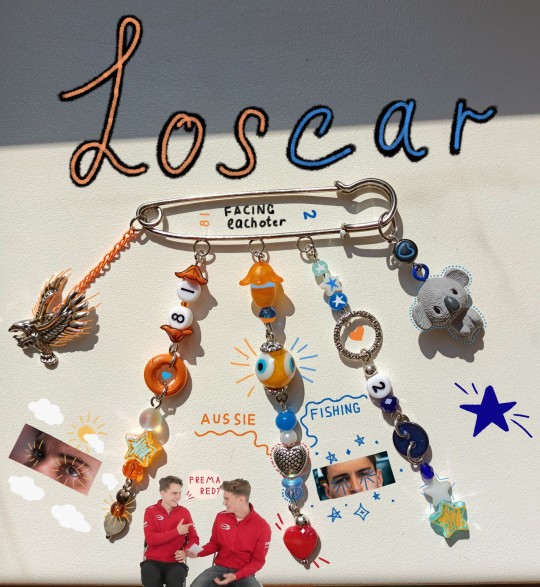
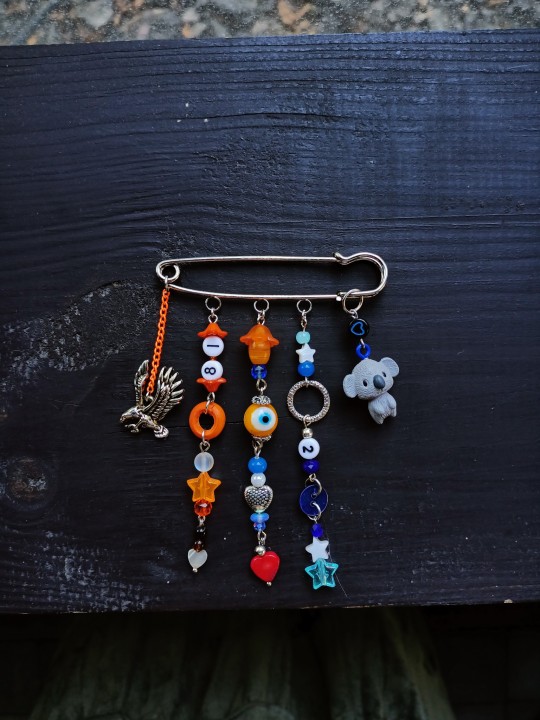
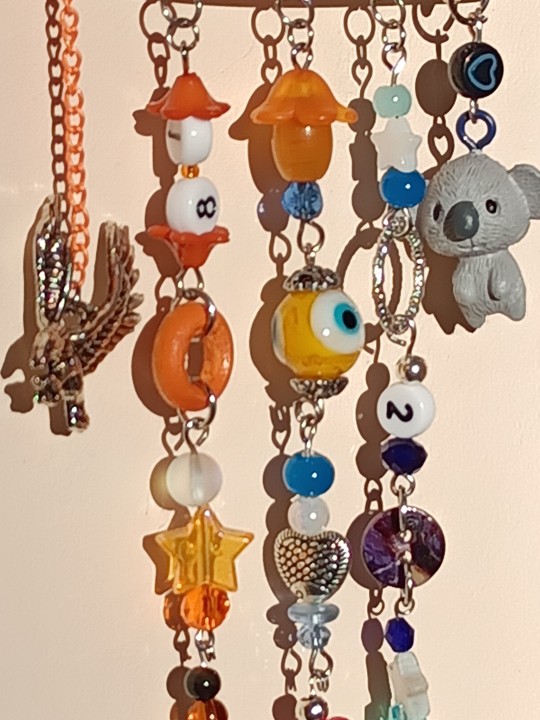
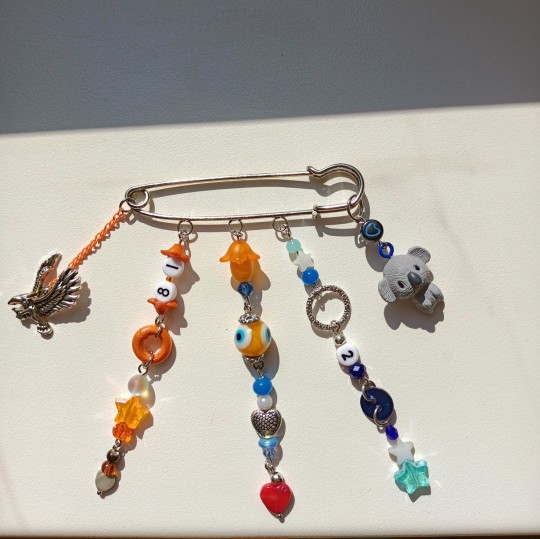
#loscar#logan sargeant#ls2#oscar piastri#op81#and now starts the rant#my fave detail is probably tge eye. there few beads like this and they were laying around until my friend said that they look loscar relate#so o started making making whole thing around that bc in my opinion it's genius (also sorry this is gonna have extremely long tags bc i had#run out of them once. maximum is 30 apparently)#I'll go by lains from here so first obviously eagle. i think it's hilarious and what's even funnier is that i bought those charms before#even knowing who Logan was. just for shit and giggles#also to coala i added a bead on top to somewhat match the height#also i love mixing up their colours bc I'm insane about that. how they ideal negatives of eachother and how orange fits logan while blue-os#so i also mixed it up with those animals charms and their attachments here#next stop - oscar lane. there not a lot of black which is bas but at least last heart is actually black. beads above it represents eyes#(you can see with doodles) and next one is for his hair but i couldn't find how to show it#and round see through bead i use for his helmet bc it shines with red yellow and blue#middle part - i talked about the eye but also beads above it. i tried to match tones so they won't clash#then fish and i love that it's in form of heart bc i associate both of them with water so much i needed something here#and bead underneath that is for Logan eyes ofc. for doodles there tried to use brown so oscar would have blond/logan brown but didn't work#AND READ HEART. “-WELL IT'S NOT YELLOW” “PREMA RED THEN?”#as you can see I'm totally normal about their prema times plus i love how it stands out with everything else and can be read as#usual meaning of red hearts. also made out of corals so it fits them too#and last but not least - Logan my beloved#first and foremost STARS#I added as much as humanly possible party bc of American meme party bc i fucking love stars and associate him with them#also added all williams shades of blue and even white so it covers all that#okay no I lied a bit bc i used a button for their dark blue#another thing i would like to mention is metal ring bc it has extremely small hearts on it that you need to look for to notice#I HIT LIMIT FUCK.last thing to say is how I tried to play with circles in middle of every lane. okay goodbye
72 notes
·
View notes
Text
Kudo is actually such a kind, soft-hearted guy that had to toughen up because he cared too much
He looked at AFO's rule, and even though he was weak, he had that glint in his eye that has been referred to as the "will of a hero" to oppose him. A hopeful glint shared with Midoriya, Bakugo, and Hawks
He even parallels Hawks when they talk about that particular look in their eye
From a glimmer in the eye, to which eye is shown, how much of the face, a similar angle of the face, and placement of text questioning the existence of that light,
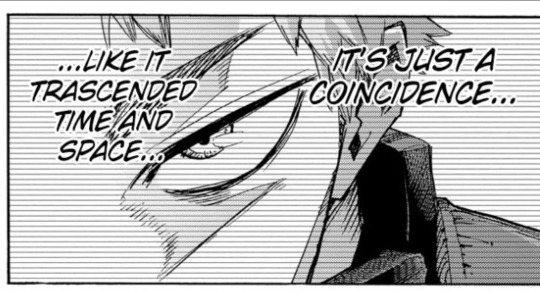
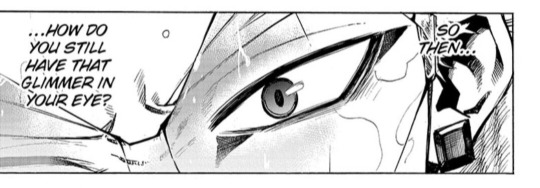
He stormed to kill Yoichi with Bruce, but couldn't, once he saw the state Yoichi was in. Even knowing he was the enemy, he still reached out his hand and never let go, even when they were running

When Yoichi died, even though they'd only been together for two months, Kudo still cried and froze up.
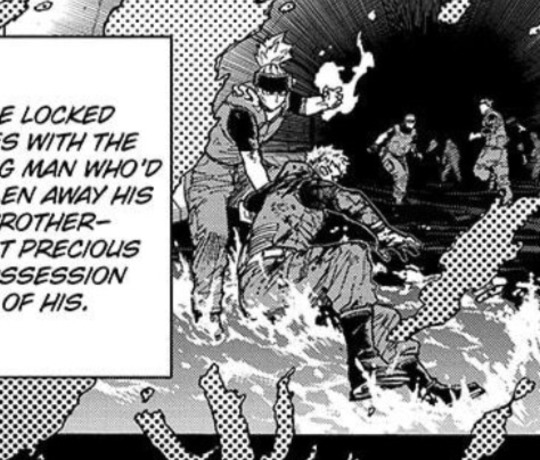
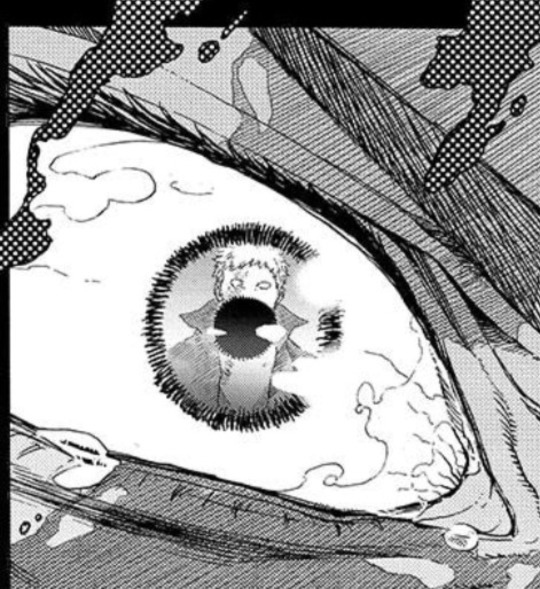
This is a reaction from a man who repeatedly used lives as a stepping stone for his own goal.
Kudo said himself, that victory was life, and defeat was death. He had killed and seen his friends killed over and over, but still cries when it happens again. And to someone he only knew for two months, at that.
Kudo gathered allies under his cause, and they were loyal enough to die for him. Bruce cries (still smiling tho) facing AFO, tried protecting Kudo when he froze up at Yoichi's death, and we see all Kudo's comrades dead in the end. Maybe Bruce was suicidal when he went to face AFO, knowing he'd die, but most of his comrades (and Kudo) were already gone. Their cause was snuffed out, but the will persisted.
Kudo is a bit like Aizawa.
A bit crass and blunt, doesn't like beating around the bush, but he can clearly see what kind of person you are. He's not openly kind, but you know he cares so much, but has also lost too much once. He's seen his friend(s) die, and shouldn't it have been him in that spot? Shouldn't he have died instead, but was forced to continue living for that dead person's sake?
His speech about why we call Abilities "Quirks", recognizing people's intent over raw power is the real power. (Ch 369)
He's blunt and goes straight to the results rather than beat around the bush, but it doesn't mean his heart is frozen and he doesn't care about you. (Ch 408)
He cares so much, and that's why he has to do so much. (His whole Resistance thing, figuring out how Yoichi's Factor works to make sure Yoichi and his will can live on in some way)
He recognizes that Midoriya isn't driven by duty, but that he genuinely adores Quirks too much. (Ch 414) He could look at Midoriya, read that immediately, and even though he looked through his memories, Midoriya's character was his takeaway. Not that Midoriya is an idiot for letting himself be stepped on, or that this kid was bullied, but that Midoriya could see the goodness in others.
Like how Aizawa saw that Midoriya was relying on the reason [It can't be helped] whenever OFA broke his bones and told him he can't always break himself just because he could be fixed (Midoriya's recklessness that showed itself on the first day of school). He called out something that was an underlying, innate belief to Midoriya, that was so normal to the teen, and no one else had brought up as wrong to him.
The first thing they perceive is a person's character.
When Aizawa tied up Midoriya on the first day of school, he wasn't telling him off over his Quirk destroying him being a PR thing or too gruesome for the public. It was out of the fact that his Quirk shouldn't destroy him, because it's dangerous for Midoriya.
Aizawa came off antagonistic, but he was looking out for Midoriya. He didn't want him to keep breaking his whole arm, he didn't want him to get stuck in the mindset that he had to get hurt to use his Quirk, he was looking out for his wellbeing from the start. A kid he didn't know personally until that day.
Kudo did a similar thing. He turned his back, and refused to help, because they were putting their hopes in a delusional boy who would go too far. When the vestiges realized their gathered Abilities and Quirks were letting Midoriya have the freedom to do as he wished, Kudo already knew, only saying "His path is the right one". He could relate to having to run full-sprint to see your goal realized, even if everything opposed him, but didn't want Midoriya to go through that same path alone.
If he were alone, he'd be like Nagant. He had to have comrades to be like Kudo, able to continue and stand for their beliefs, but having comrades to fall back on, or pull him back when it's too much. That's why he follows up in that moment with, "But, if there's something Midoriya does need..."
Kudo and Aizawa could see themselves or their comrades in others, and knew how to approach those character flaws that were normalized to others and said person.
Kudo could see others for who they were, and I think it's this, and his caring nature, that he gathered so many allies with him. He knew when to be blunt, when to show kindness, that the truth hurts but needs to be seen, was actually very logical and witty, and when to step aside and let people do their thing, even if it wasn't the best move (like saving All Might). Because that was what was best for that person.
It's not like people would join someone so wholeheartedly without conviction and being left unseen by that person. So many people were willing to die with and for Kudo, and Bruce believes in him so much.
When All Might's vestige was fading and becoming more solid, Kudo had to look away. They knew it meant All Might was dying in the real world.
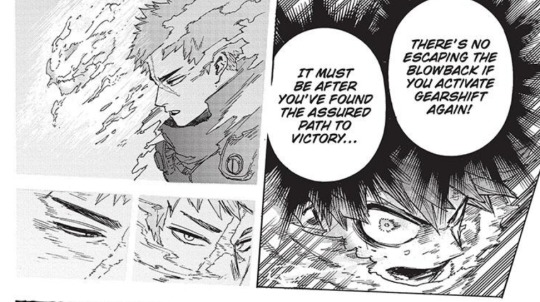
Kudo was telling Midoriya not to intervene with Gearshift there. But once he saw All Might genuinely dying out, he couldn't look at him, and kept quiet. He stopped hanging onto battlefield logic of necessity, shut up, let Midoriya do his thing, and it saved All Might. It saved Midoriya from seeing his idol die in front of him, and Kudo didn't have to see another ally die beside him.
The chapter is literally called [We Love You All Might!!]. Even if it's just meant to focus in Bakugo and Midoriya, and only has 2 exclamation marks, it can't discount the world is watching. The vestiges care about All Might too.
When the vestiges come up with the plan to forcibly transfer themselves to deal damage, Kudo volunteers himself as the test dummy. Sure, he backs it with a lot of reason too, but he didn't want anyone else to go first as a test drive
He, with a Gearshift Ability that resembled a manual car, was the test drive. Ha ha pun- *gets shot*
En tried going first. Kudo rejected him, saying he would go first.
"Part ways with Gearshift [me], and you'll be free of the crippling recoil too."
Too. TOO.
KUDO JUST WANTED TO GO AND BE DESTROYED FIRST. HE PUT THE FREEDOM OF RECOIL DOWN AS AN EXTRA BONUS SO THEY'D AGREE WITH HIS CHOICE.
I'd cut the image so it looks better, and I can use Bruce's words elsewhere, but this is an image limit, so,
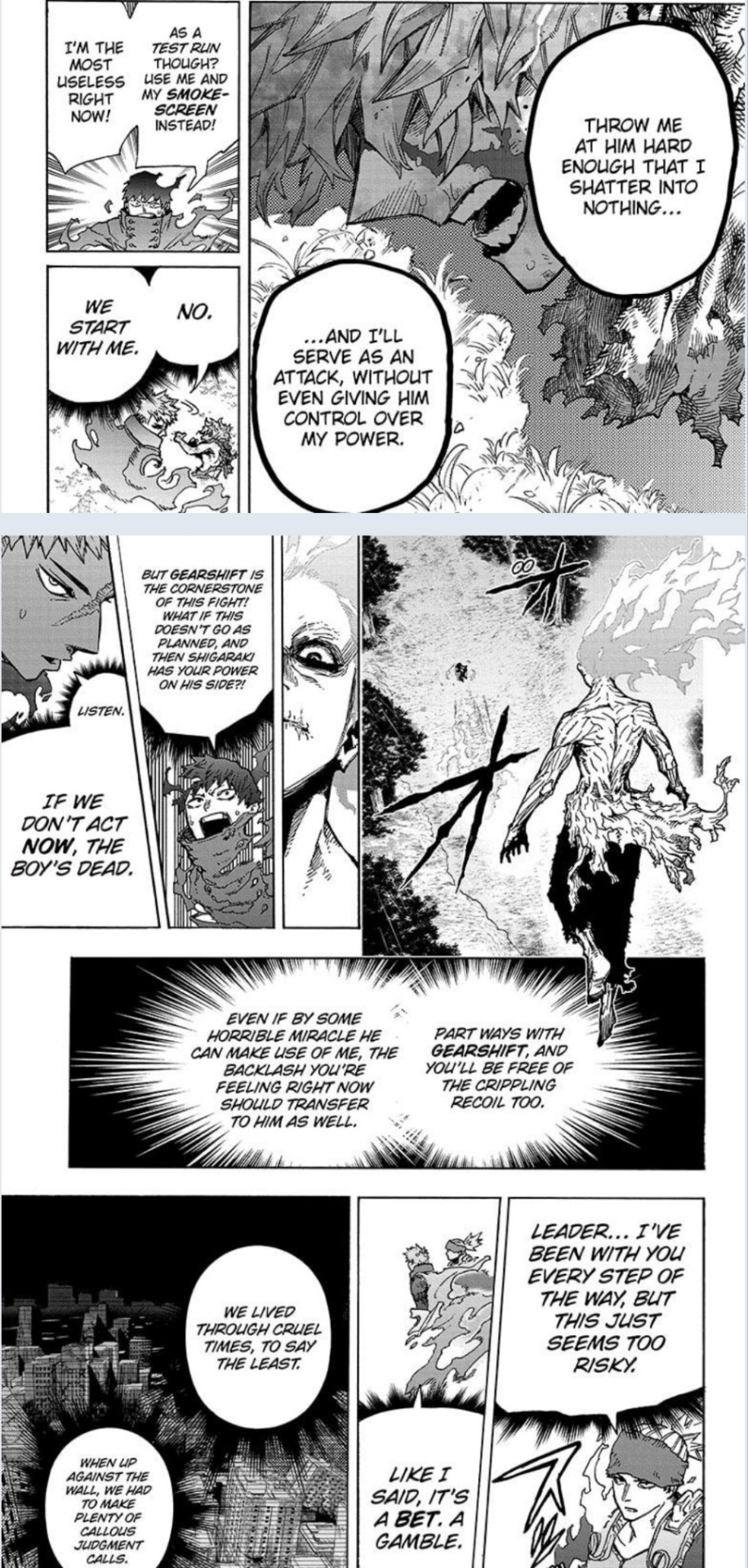
- Kudo refused to let anyone else go first. This was before giving reasons to convince them he should leave first
- En gives reason to why it can't be Kudo. Kudo just says, "Listen." and reminds them of now.
- Look at Kudo's face when he says that. The guy knows what he's doing when he cuts off En, and would probably be a horrible liar. He might as well be pulling this out of his ass.
He's said "The world will end" "You have to or else" "Five minutes" "You're going to die" a few times in this fight already. DUDE STOPPP
(Terrible liar and a guy who purposely eggs you to torment? What a great friend he would be [yknow, when u make ur friends freak out by being ominous or reminding them of stuff. Like Toast to Lilypichu in a game of Observation Duty])
- "Too."
- Bruce's trust in him, but knowing when to pull Kudo back from going too far
Also, when he's transferred, he smiles to Midoriya. He knows he's about to die again, but the last thing he does for Midoriya is
1) Take away the recoil of his existence as a Factor on the boy
2) Reassure him that it's okay, so it doesn't weigh on his conscience
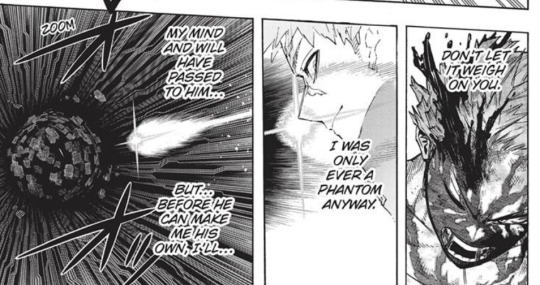
Even if only in thought, STILL!
KUDO LOOKED SO PROUD OF MIDORIYA!
I bet Kudo is suuuch a sentimental fool
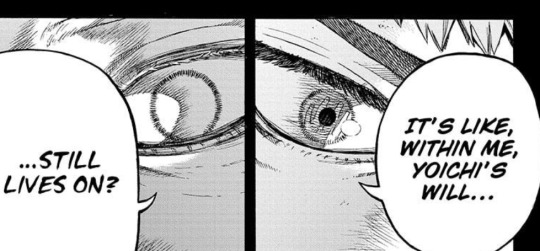
> [Be me and watch your new friend die]
> [I have Yoichi's Factor]
> [It's like I carry his will now]
> [Have a glint of opposition in my eye that drives the Demon Lord and my comrades (Bruce) crazy]
> [Hey Bruce, let's figure out how it transfers]
> [Bruce's common sense VS my rabid ideas]
> [I win]
> [Bruce was unwilling the whole time and still ends up with the Factor]
> [The Factor is named One For All, after something in Yoichi's favorite comic book series]
> [We pass it on to the future to carry forward]
> [Even as everyone else and me dies, I make sure Yoichi and his will are safe from his Demon Lord brother that locked him up]
> [Decades later, my sweet vaulted friend reminds me of when we met]
> [I turn around and give my whole-hearted support to believe in some 15-year old boy because Yoichi believes in him too]
SEN - TIM - ENT - AL!
When Shinomori was stolen by AFO, Shinomori pushed everyone away before they could really notice the invader. Kudo called out for him.
Everyone is in shock, but I don't think it's a mistake that the text bubble calling out for Shinomori is pointing from Kudo.
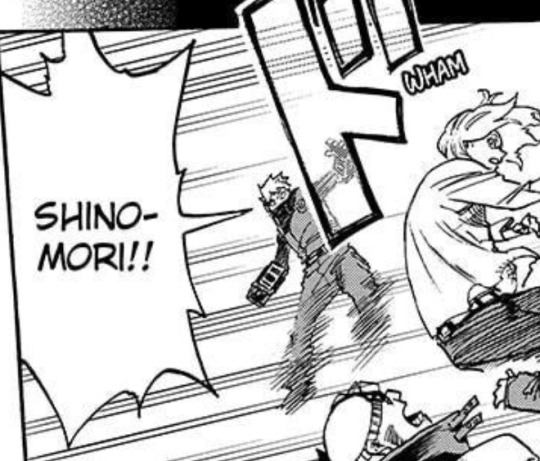
All For One made it through and is ready to steal them, but the first thing Kudo did was call out for the one at the very front.
[On the post I made that mentions Shinomori pushing everyone away] What if Kudo wasn't pushed away? What if this was him at the front, realizing the danger and turning around, but being unable to do anything for Shinomori when he saw?
Like Bruce, Kudo communicates. He doesn't expect you to just follow or understand him. He actually lays it out and makes sure you keep up.
He explains
- the transfer of vestiges, and why he should go first
- his Quirk
- why Quirks are Quirks
- reports to Midoriya what's happening and what's next
- to Yoichi why they couldn't trust in a delusional boy. In a way that wasn't Bruce's roundabout "we lived in a terrible era and a leader gathered us"
When En panics, he barks at En to keep up. By barking at him, rather than any other way he could've used his tone, it shuts up En in his frantic babbling. Kudo also lets Vestige Might put in his thoughts to understand better, and uses it.
Eye reflection. Kudo can really see people for who they are, and understands others, and himself.
I can't repeat the pics cuz image limit, but look at previous panels here. For example, Kudo saying Yoichi's will lives in him, and when AFO reflected in his eyes
It's something I learned from Re:Zero. When a person in reflected in one's eye, something something that person can see the true core of you, of what you really are underneath everything. The eyes are the window and mirror [glass] of the soul. I finally see the true you.
AFO never reflected anyone.
But Kudo reflected AFO when the man accidentally killed Yoichi. He saw that AFO wasn't seeing anything, so later, Kudo smiled and mocked AFO at his own death.
"Yoichi?"
"He's gone."
"You killed him, Demon Lord."
And AFO hated that reminder.
Kudo was reminding him of what the truth was. Kudo saw it himself, and AFO blocked it out from the get-go. Kudo already knew what AFO was, what he was seeing, what he was doing to himself by blaming Kudo instead of himself.
And then, Kudo's eyes reflected his own hand when he realized Yoichi's Factor was in him.
Kudo clearly saw himself, and in himself, Yoichi. Nothing distorted it. It really was a clear mirror.
He really perceived Yoichi's will was living on, and was right. Otherwise, his eyes wouldn't have shown it.
Kudo was right about AFO. It's even implied back when he and Bruce had their backs turned; Kudo knew what AFO's real goal was. That was back when AFO preached unity and division under him.
Kudo could always see right through AFO. He really understood people from the start. And he never tried making up truths to justify what he was seeing, facing it head-on.
Kudo's lying about the world being black and white.
Kudo and Bruce saw the world as black and white. This was mentioned in the void.
Kudo also says, "Victory meant life. Defeat meant death."
But it's the Resistance. It's when Japan and the world was at their lowest. The world wasn't black and white; there's lots of gray.
Kudo and Bruce would've seen this. Kudo even admits that there's gray, just not directly.
Kudo says Yoichi knows, how he killed and trampled so many lives, to get back at AFO. He knows it wasn't right, or an amazing choice. Later, he says that when your back is against the wall, you have to make callous judgements. These hint at gray moments.
Kudo and Bruce have faced and been in the gray. But it's too hard to make the right choices, and there are times there is no right answer.
Historically, soldiers would convince themselves the enemy were monsters. They wouldn't be able to fight and kill them otherwise. They wouldn't be able to live with themselves without believing in this so badly.
Kudo and Bruce had to have been the same way. They were Meta Humans [Monsters] in a time they were viewed as diseased humans. The monsters were real. And they had a Demon Lord. Kudo and Bruce literally dressed up as soldiers.
Even if they were monsters to society, being Meta, Kudo and Bruce were still human. They knew this. The ones who tried believing in only black and white were inhabitants of the gray itself.
But they have to protect themselves. Kudo is so adamant that the world is only black and white, because he can't stand the gray. What it makes him do, what it means, that he's too weak to do anything.
Yoichi is an example of that gray area. The mortal enemy's younger brother, was actually locked up and sickly. He's just a comic book nerd. And it humanized the other side Kudo opposed so vehemently.
Kudo says victory is life and defeat is death. And Yoichi asked why he reached out to him then. He reminded Kudo of that gray area, and Kudo opened up.
Kudo might avoid the gray area because it's a matter of the heart and a moral dilemma, but it's what makes him human. When there's no right answer in the battlefield, he decides on his feelings instead.
He wishes the world was black and white, because it'd be so easy. But it's not.
Yoichi reminded him of how entering that gray area led to OFA ("when you reached out your hand to me"), and it had been the best choice in the end. The gray area is real, and Kudo's left a bare man with only his emotions when he's there.
Kudo is actually really kind and understanding. He's too soft for his own good. Thanks if you made it this far, I hope it makes sense (tag and image limit)
#KUDO IS UNDERRATED NEEDS MORE CONTENT RECOGNITION HES THE KINDEST WITTLE BOY EVER#my thoughts#i think ppl who write resistance stuff should also consider that not everything was black and white#there will be moral arguments where you cant decide. and the resistance has faced those sorts of things where There Is No Right Answer.#kudo is really kind tho. exactly because he cares so much he does all these things and tries to harden himself#but like exoskeletons work - its only an armor to protect the soft squishy insides and keep them from drying out#i woke up and had to put this stuff down#me: *picks up a sentence note in my fic notes* *puts it down here and elaborates*#the line was in relation to putting down stuff about the vestiges to remember dynamics#[Kudo is the kindest despite appearances]#kudo seems like he would be fiercely protective over ppl he cares about. exactly because hes seen so many of his comrades die over and over#kudo#bnha#mha#boku no hero academia#my hero academia#spoilers#ofa#one for all#bruce#bruce is the meme of “*chuckles* I'm in danger” and its just. Kudo w/ his new crazy idea chasing him down with Gearshift and Yoichis Factor#hikage shinomori#en tayutai#yoichi shigaraki#ive been thinking he was kind for a long time but never elaborated why. if u look at his actions words and thoughts it all makes sense#theres underlying kindness in there. he wants to be kind but the world would scorch him if he didnt have a stick up his ass#also adding on to the prev tag of kudo and fiercely protective- because in their times comrades were everything. otherwise you were alone#the world sucks resources are limited and youre a diseased human [Meta]. but you have someone willing to walk with you.#also about the [Kudo is the kindest] note among the vestiges- i dont think any of the other vestiges would do what kudo did#calmly volunteering himself rather than it being in panic. extending a hand and saving what shouldve been his mortal enemy. yknow
120 notes
·
View notes
Text
uuuuugh finally back home, after waking up at ass o'clock in the morning twenty-three hours ago to go to the airport
lots of sick people on both my flight to and back, but hopefully I will not be joining the legion of the sick
(though on that note, @carebooks had a sick-themed ask that I'm very keen on getting to in the morning)
#i started writing a ficlet in answer but i'm outta steam#operating on 4 hours of sleep in the past 48 hours is my limit on being able to focus enough to write#but suffice it to say we will have jon the stubborn + rhaegar the caretaking martyr + daemon frantically consulting laenor and rhaenyra#bc haaaaaaaalp what does he do what do you MEAN he could lose his babies?#(they're not that sick he's being dramatic but it's his first time!)#GET THOSE LEECHES OUT OF HERE MELLOS#DAEMON IS NOT AFRAID TO DEPLOY DRAGONFLAME-CAPABLE HATCHLINGS
30 notes
·
View notes